17/6 — Day 47 — 5mi / 8km
Flies and I woke up in the same situation we went to sleep: on the ground. Our sleeping pad, perforated in a dozen places after Flies and tried to pin it down to dry with rocks, lay in a puddle of uselessness beneath us. Our first week in the Sierra was over. Now it was 5 miles over Kearsarge Pass to Onion Valley, and the road to Independence. We would meet Tia there and stay with her friend, Linda, who owned Ray’s Den Motel.
Kearsarge Lake in a reflective mood
Atop Kearsarge Pass, in the cold breath of the Sierra morning, I said, “Good job, Flies.” She held out her hand and I shook it. Business well transacted. It had been a big week. I couldn’t actually feel my hands—despite being known on the trail as Hot Hands, my poor paws seemed perennially numb.
We descended past several gorgeous lakes, inset like gemstones in the escarpment, and down along a cascade that tumbled through the aroma of sagebrush to the trailhead. We hitched a ride with a lady called Jill whose car didn’t start when we got in. “Shit,” she said. “I just got it back from the mechanic yesterday.” The car was from ‘93. “Normally I drive a pick-up,” she said, “that one’s from ‘86.” We pushed her car down the hill and hopped in once it chugged back to life. During the drive she railed against “our imbecile president” and the LA water and power department, whom she (and many of the residents of the area, we would learn) called “the evil empire.” Jill’s car didn’t start after she dropped us off in Independence, either, so we pushed it around the block, putting our enhanced calves and gluteals to good use, and eventually it got going again. Jill took off to have a word with the mechanic.
Independence used to be a small town and these days it’s even smaller. There was the post office and a gas station, where you could shower for 5 bucks. There were several churches, one with a plaque pointedly commemorating “victims of abortion,” a dinky ice-cream store, and a county court that was stately to the point of incongruity. It flaunted tall Ionian columns and well watered flowerbeds out front, about the only well watered thing we’d seen since descending from the mountains. By the flowerbeds, there was a boulder dedicated to Pioneers of Inyo County featuring that dubious passage in Genesis, 20:15, where God poses as a colonial administrator: “My Land is before thee: dwell where it pleaseth thee.”
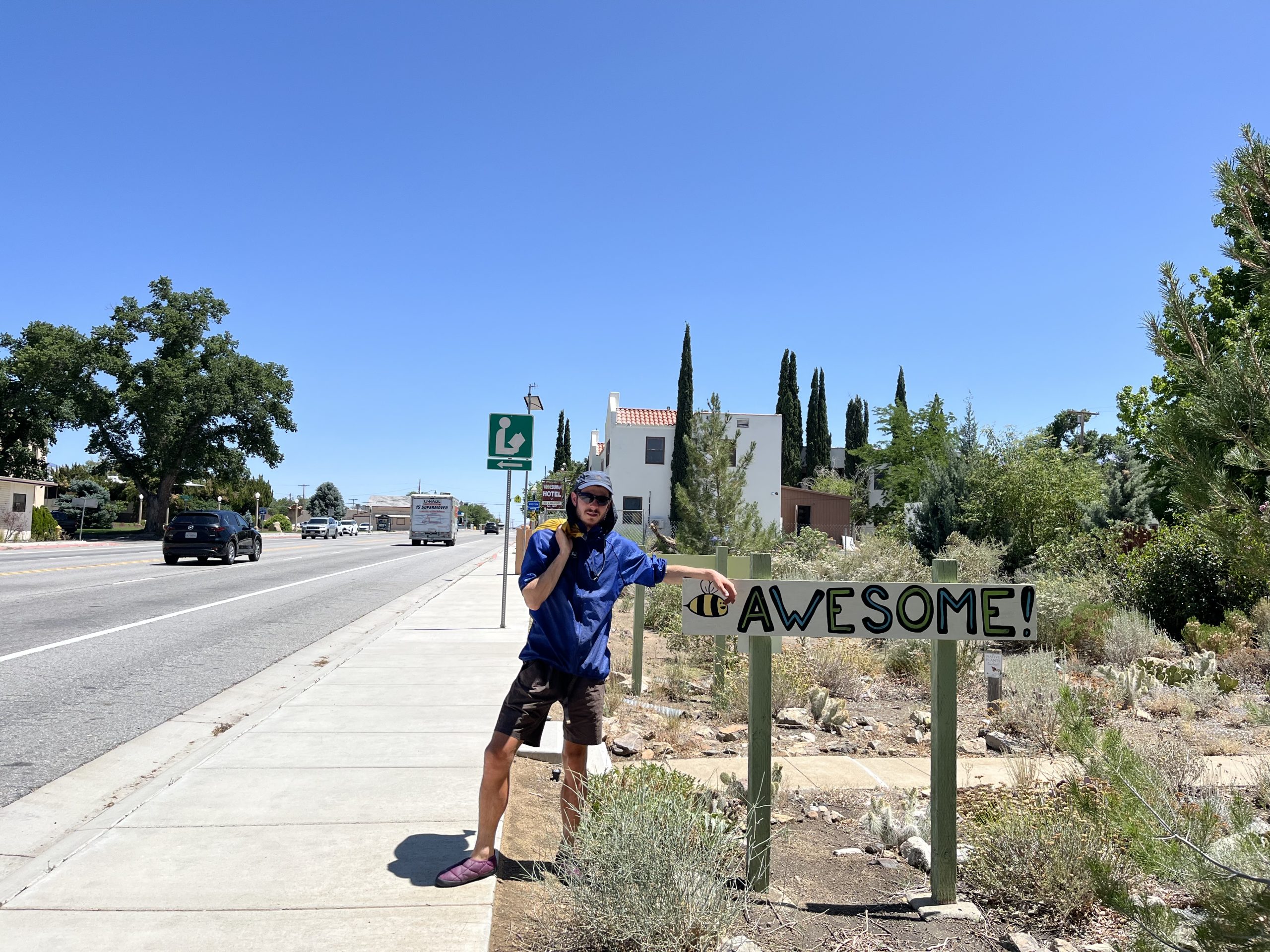
Out on the town!
We went to Ray’s den, where it pleased us to dwell. There was no sign of Linda. On the office door we found a note with her business hours: “I open around 8-9. Sometimes as early as 7, but every now and then as late as 10, or 12. I close at 4 or 5, but sometimes much earlier. Some days I’m not here at all. Although, lately, I’ve been here almost all the time, except when I’m not here, but I’m usually around then, too.”
As we were puzzling over this, Linda materialised. “Hi,” she said. “Hi,” we said. “We’re Tia’s friends.” She ushered us in, charged us almost nothing to stay for two nights, and showed us to a lovely room. Unlike most places in the US, Ray’s Den showed much evidence of fastidious care. Flowers and shrubs were bedded neatly and happily all over.
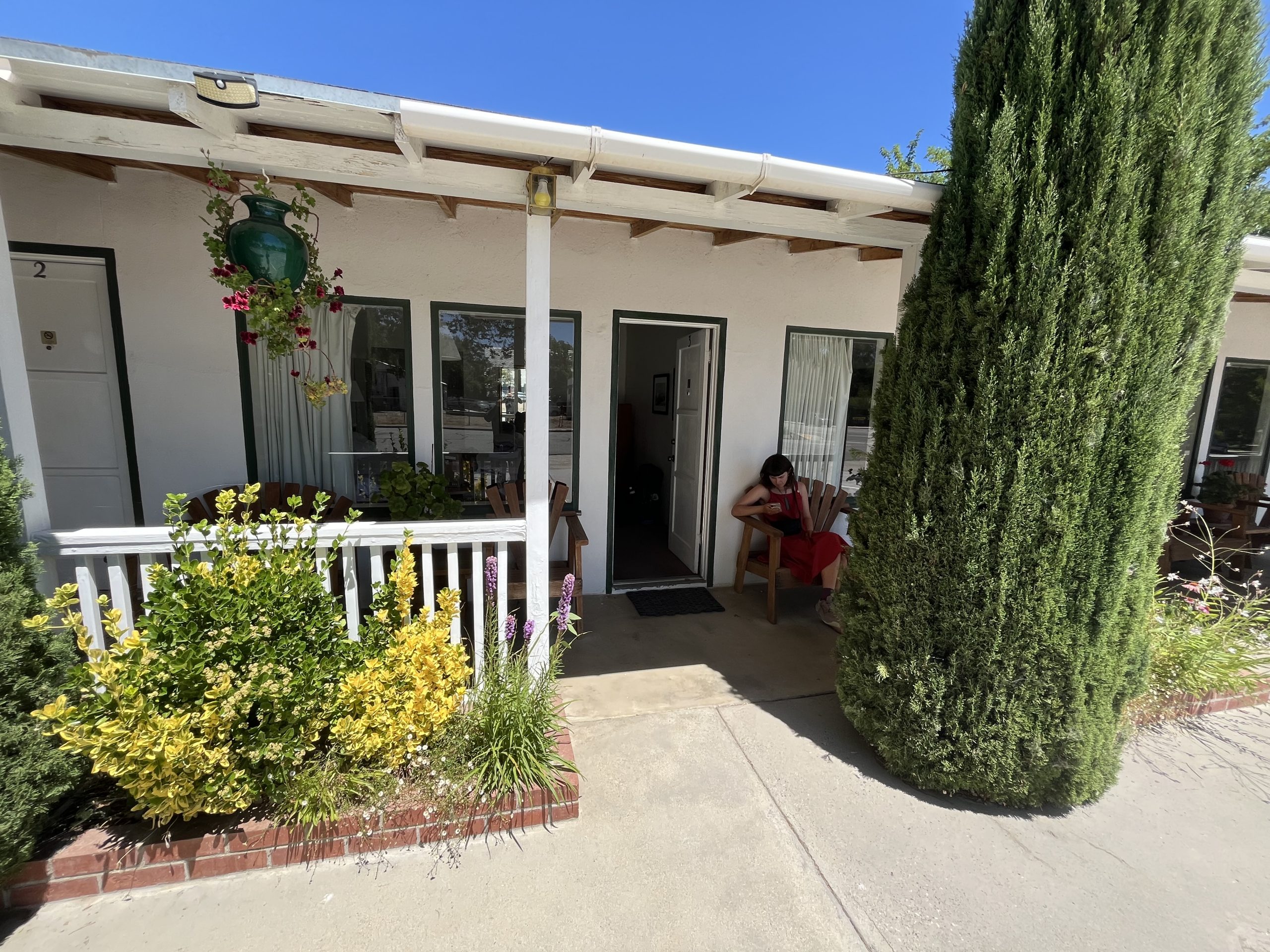
I got down to blogging at the library, which was in a kind of cluttered basement. The librarian there was intelligent and world weary and set me up at a Stone Age computer amidst stacks of books before dictating an email to her secretary requesting a renewal of funding. Outside the library, there was a sheriff’s van which said “Delivering a Professional Service” in cursive on the side.
Back at Linda’s that evening we did our hiker chores—washing clothes and dishes, charging everything, portioning out our resupply—and caught up on the head-spinning news cycle with all protests and reprisals and the spectacular falling out of the two biggest egos on the continent.
18/6 — Day 48 — 0mi
Tia had arrived from LA late the previous night. In thr morning, she took us to Manzanar, a hot, dusty tract of land down the road from Independence. It was an orchard before the water heist, and it served as a Japanese internment camp during WWII. Wind whistled down the valley, hot and strong, like the world’s largest hairdryer. On the road a sign had said “High wind alert: tall vehicles discouraged.”
After Pearl Harbour, Tia’s mother and grandparents were incarcerated at Manzanar, without wrongdoing or trial, for three years. They lived among 10,000 people, mostly American citizens like them, in one square mile fenced with barbed wire. In the reconstructed school block, someone had written the preamble of the constitution on the blackboard in cursive. It awkwardly proclaimed the national commitment to “establish Justice, insure domestic Tranquility, provide for the common defence, promote the general Welfare, and secure the Blessings of Liberty to ourselves and our Posterity.” The Sierra stood to the West of the camp, huge and somehow unreal, the haze making the escarpment look almost like a projection on a screen.
Trump’s administration had recently issued an executive order, “Restoring Truth and Sanity to American History,” compelling park rangers at Manzanar and elsewhere to put up signs asking visitors to report any depictions of U.S. history that “inappropriately disparage Americans past or living.”
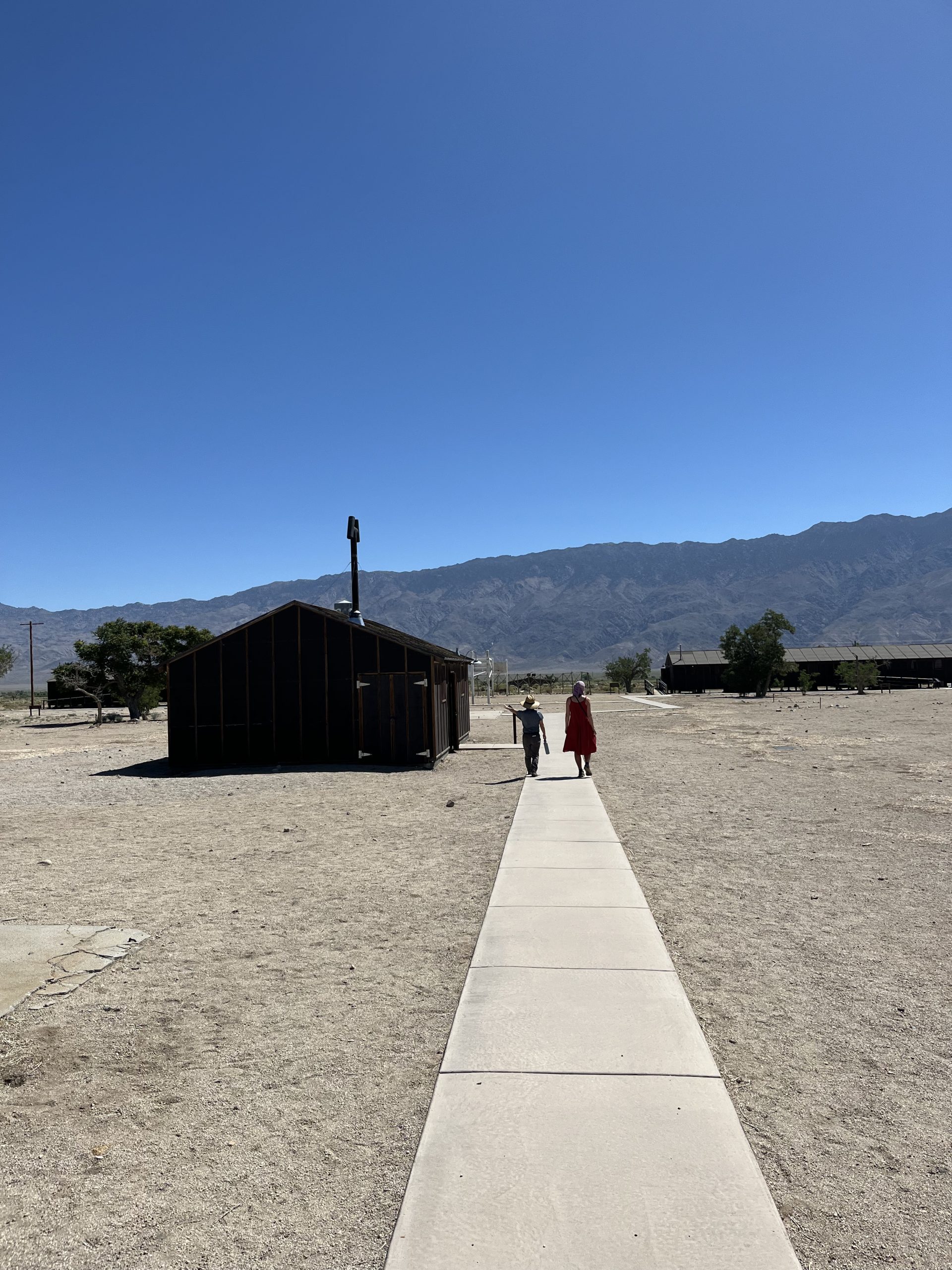
19/6 — Day 49 — 5mi / 8km
“Sierra mode-reactivated,” Grace said, as she marched up the switchbacks out of Onion Valley. Tia had dropped us back at the trailhead that evening. We were going to hustle back over Kearsarge in the last of the light, camp by the lake, and rejoin the PCT the next morning.
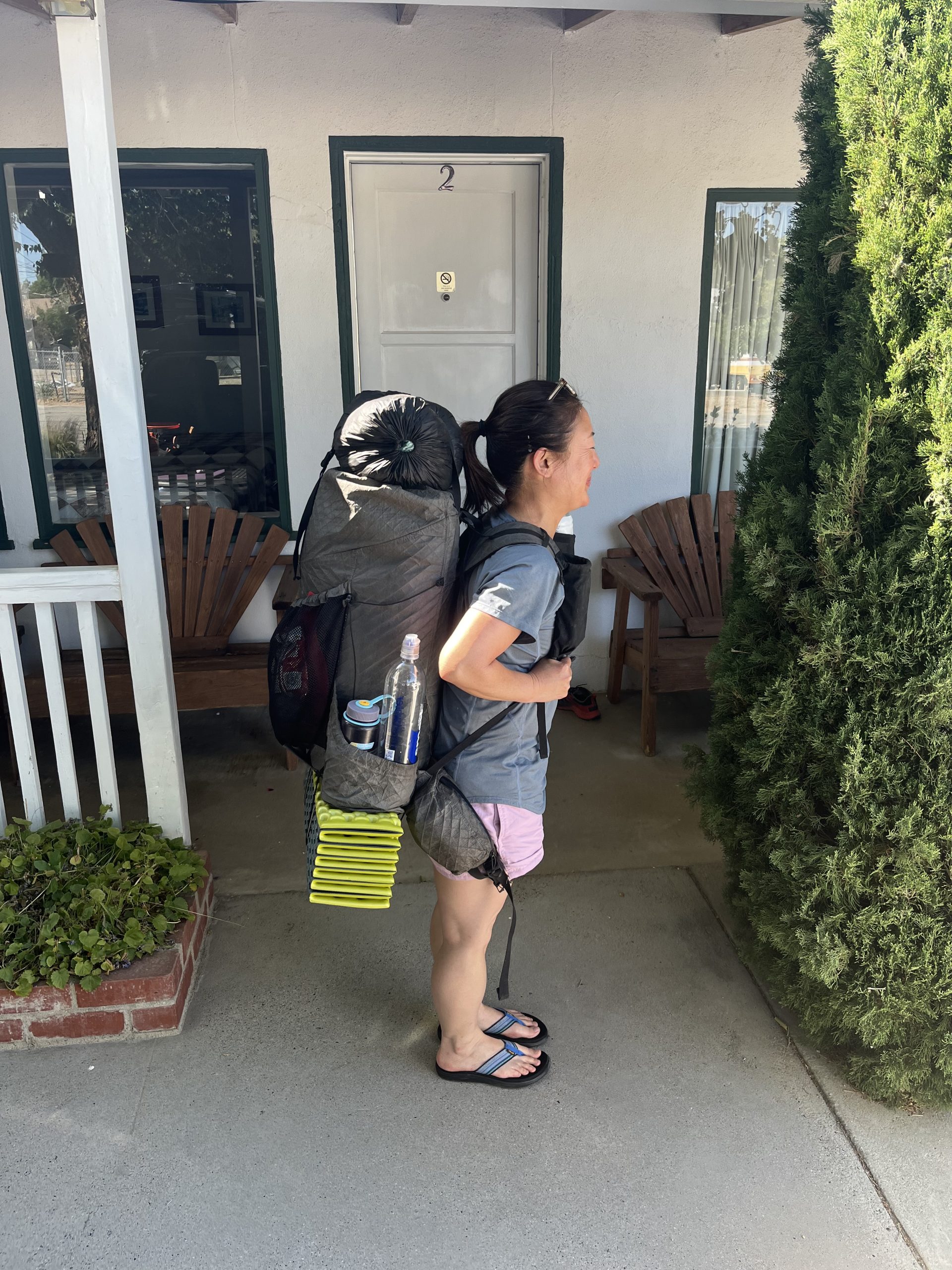
Tia trying my pack on for size
We’d stuffed ourselves at a pot-luck the previous evening. Linda collects stray animals and people both, and had folks over for dinner regularly. Tia had brought Tamales. The owners of the ice-cream store carried over some of their wares: the lavender and honey blend was particularly delectable with a Mulberry cake that an ex-Manzanar employee brought along. All the employees and volunteers at Manzanar congregate at Linda’s. There was a young archeologist there who’d recently been fired by DOGE and then, after a court order, rehired. Flies and I had tried and failed to breathe new life into our sleeping pad, so Tia had shuttled us out to Lone Pine so Grace could purchase a new foam pad. I would be, O joy of joys, sleeping once again on the 3/8th inch, torso length backpad.
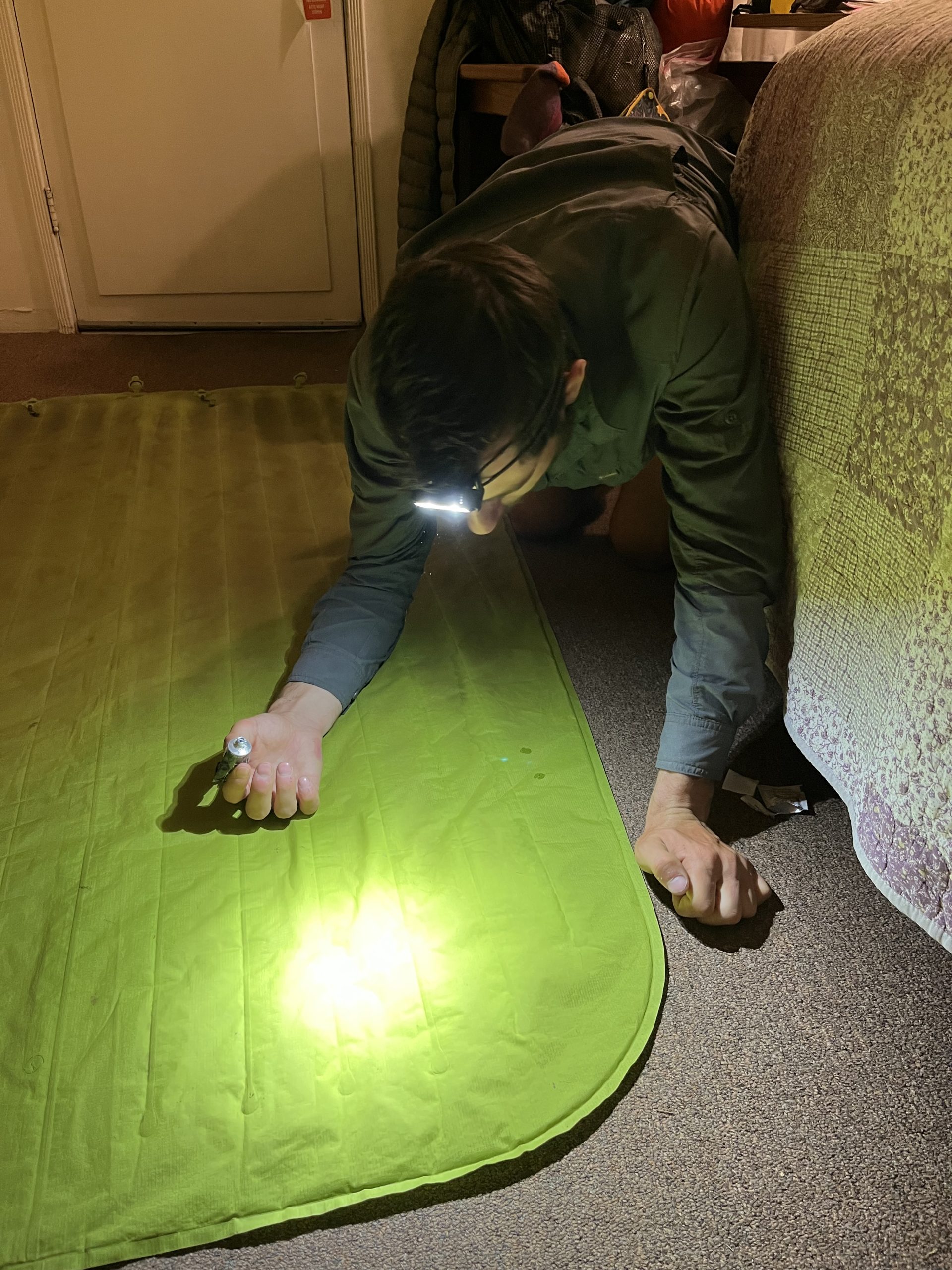
A fruitless endeavour
But it had been a special stop in Independence, with generous helpings of food and of amity. We felt like residents by the time we left. Linda popped into Bishop and got us some fancy coffee sachets. Tia gave us some 100% DEET big repellant powerful enough to melt steel. Now we were flying: up the 5 mile, 2500 feet climb up to Kearsarge in less than 2hrs, the 7 days of food packed tightly into our bear cans in our packs seemingly weighing nothing at all.
Sunset broke as we crested the pass, dyeing the ranked ranges pink and purple, and the wind whipped through and stirred all the colours about. It was the sort of view that makes you think that whomever or whatever made this world had a very credible artistic sensibility. One lone hiker passed us going the other way. “How fucking epic is this!?” he said.
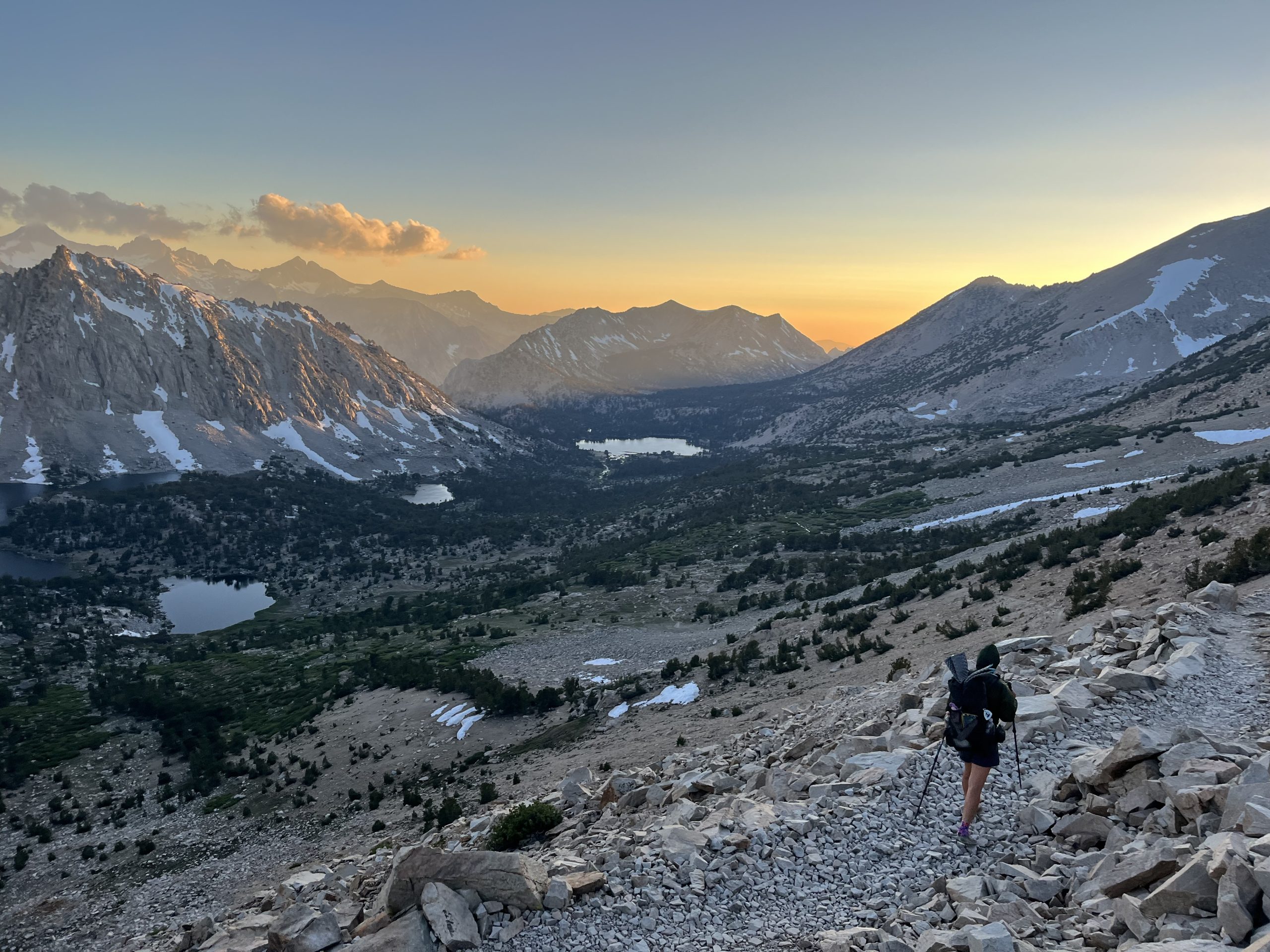
20/6 — Day 50 — 20 mi / 32 km
Flies awoke with a headache. We weren’t sure if it was altitude related. Maybe we’d declimatised down in the valley? I realised that I’d lost my sunglasses coming over the pass, which was a problem: we had a lot of snowfields to cross this section and I’d be a sitting duck for snow blindness without sunnies.
We set off early for Glen Pass—a bit of a dud name for one of the more intimidating passes on the trail, 12,000 feet and change with a steep descent on a northern side still deep in snow. En route to its base, we found a hilarious note from a ranger appended to a sign, which said “if you see a bear, chase it like you are going to catch it and eat it. Get mad. Be mean. They will run in terror.”
Shortly thereafter, Flies ducked into the bushes. “What’s that?” I asked. She stopped and held up the resealable bag of freeze-dried figs we’d been putting in our oats. “I’ve repurposed this for my used TP,” she said. “Make sure you don’t get confused with the breakfast stuff.”
Reassuring little trenches had been kicked into the snowfields over Glen Pass by the passage of myriad hikers, and the sun wasn’t yet high enough for snow blindness to be a problem. So crunched down happily in our microspikes. The snow intermittently gave way to jumbled boulders. It was slow going: about a mile an hour. But at the bottom we found the Rae Lakes, a coterie of gorgeous, clear lakes grouped in the high basin below the pass.
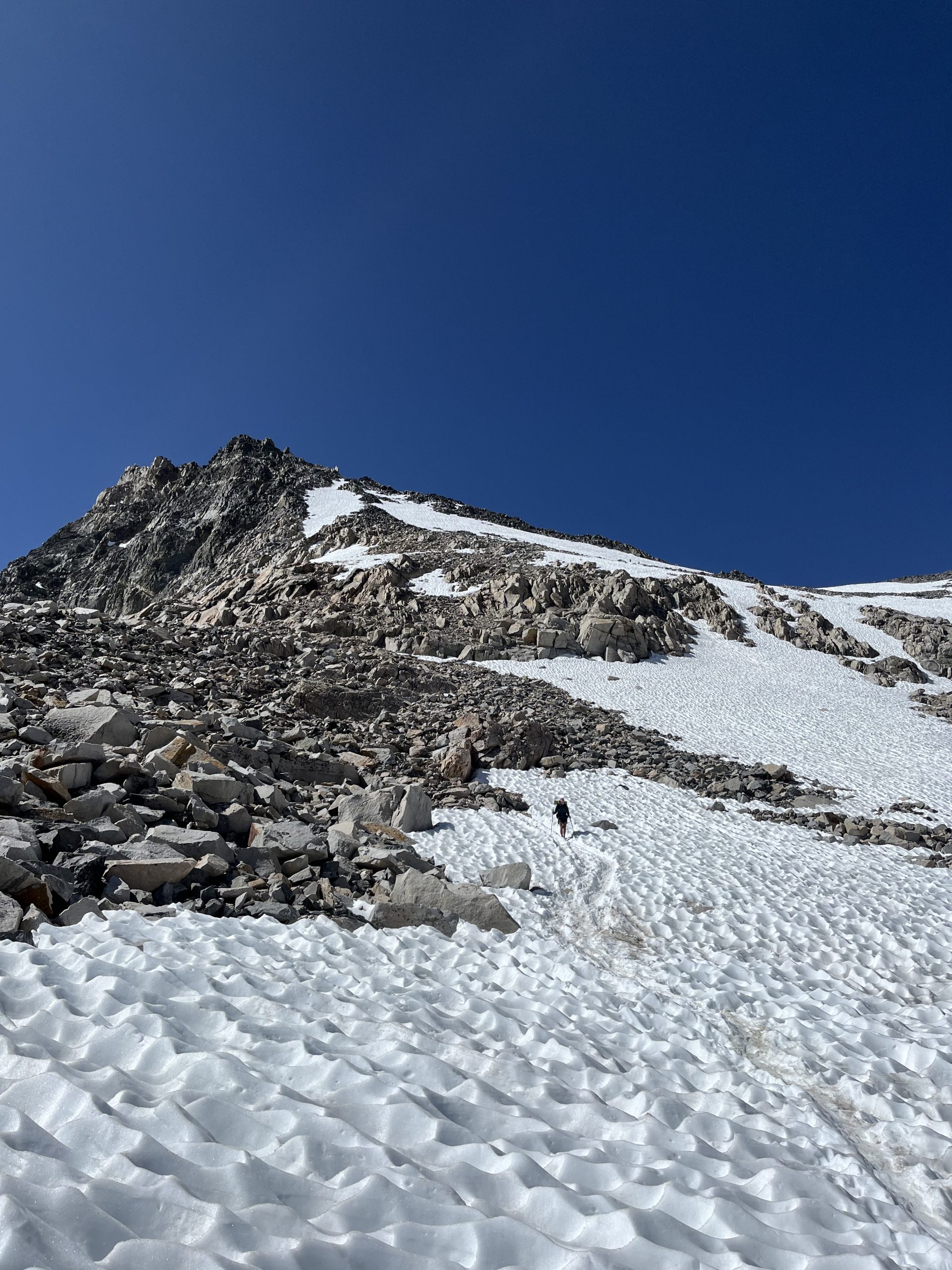
Little fish were swimming in the water: they had leopard-print scales and red fins with white trim. “What are they?” Flies asked, placing more faith in my icthyological acumen than was warranted. “They look kind of trout-y,” I said, “but that could just be because it’s a fish.” We climbed in the cool water with our trouty friends and burned in the cold fire of the snowfed lakewater.
Replenished, we walked down a valley that basically bathed us in pleasant sensations. It was still weird, how nice everything way. In the desert, the virtue of endurance was more in demand than the virtue of appreciation, but nkt here. Even so, Grace was still feeling subpar, her nose blocked and head stuffy. She shot the occasional snot rocket into beautiful beds of wildflowers. Necessity excuses much in the way of irreverence.
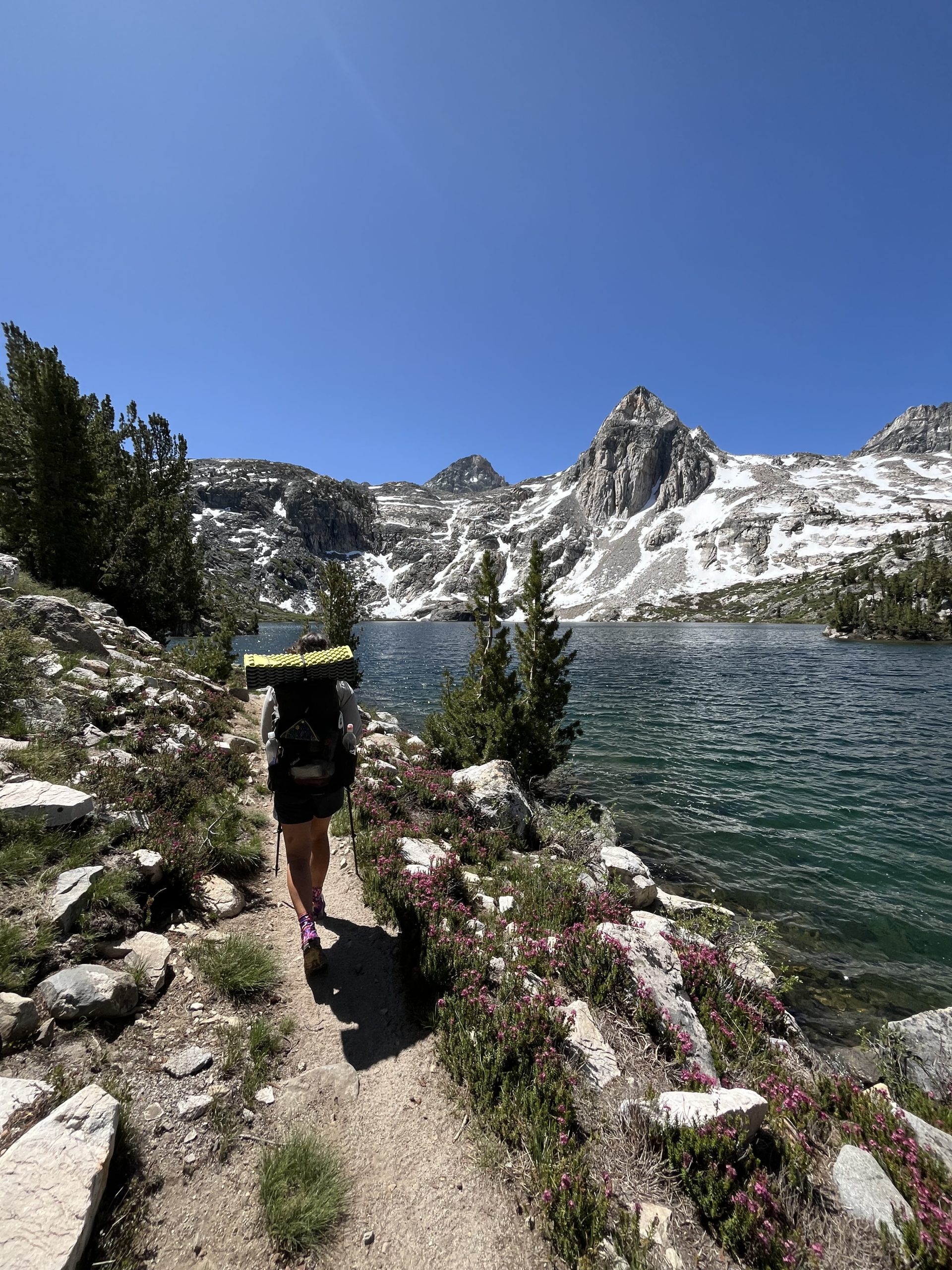
Pleasant
We turned up the Woods Creek Canyon, where the cliffs were scored by glaciers. As we climbed a riotous cascade tumbled down slick rock to our right, churning itself to foam in the pools. Quaking Aspen fluttered their leaves nervously in the light breeze and in the various trees insects buzzed like defective electrical appliances.
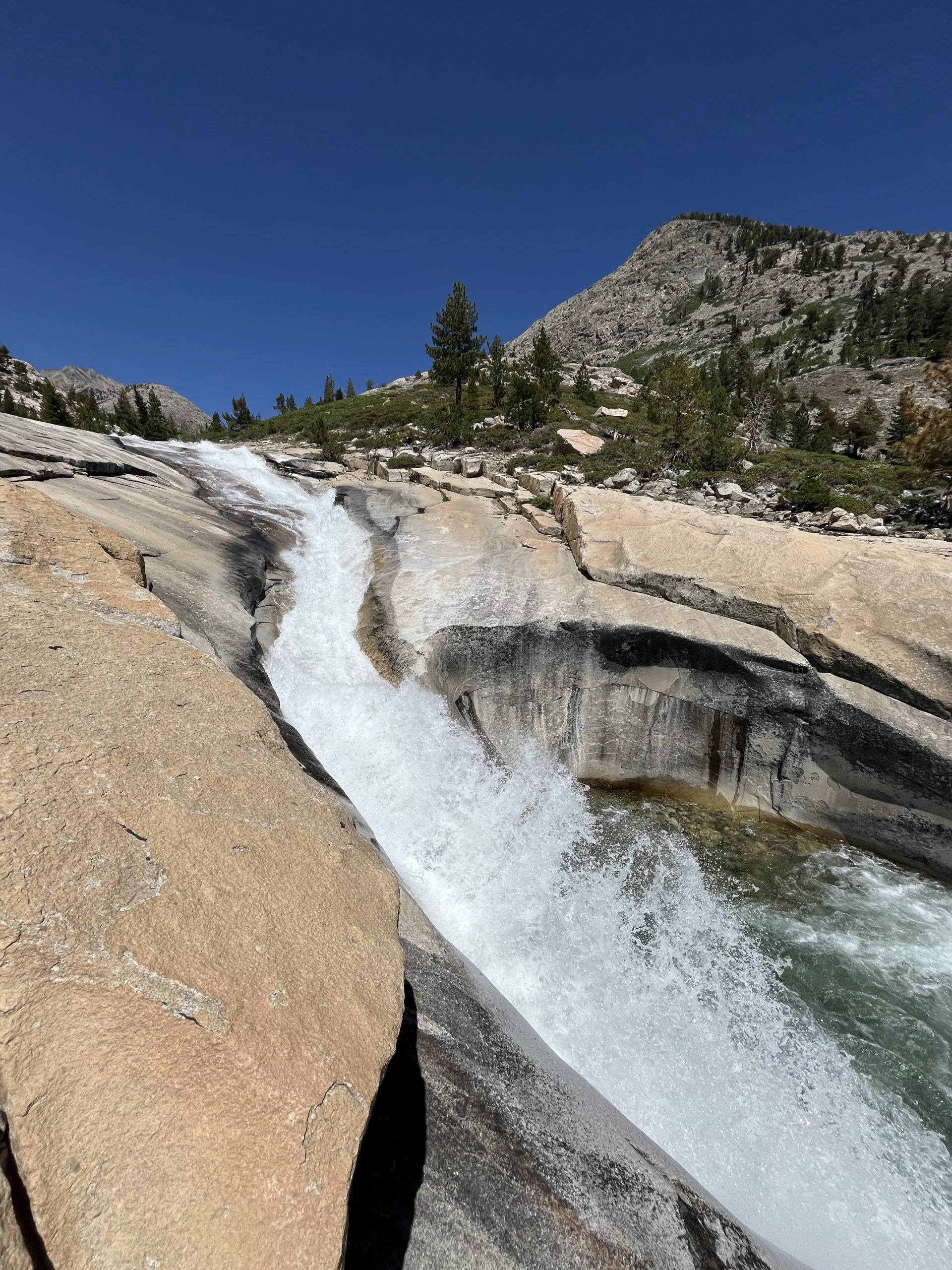
It had been slower going than we were used to and so we climbed up into the basin below Pinchot Pass in the late evening. This basin was a kind of bleak negation of the Rae Lakes basin: desolate and foreboding, barren and rocky, the peaks around stained red with iron. Good tent sites were in short supply, but we managed to cramp ours on a patch of rocky soil hard up against the trail, no protection from the icy gusts that had started whipping through. Flies put on every layer to hand, her body buried 5 layers deep, in warmth variously plundered from the breasts of birds and sheep and alpaca. Her head was cosied inside a beanie, two hoods, and a balaclava. She looked like the Michelin man, and crawled into her quilt with a Nalgene hot water bottle for fortification.
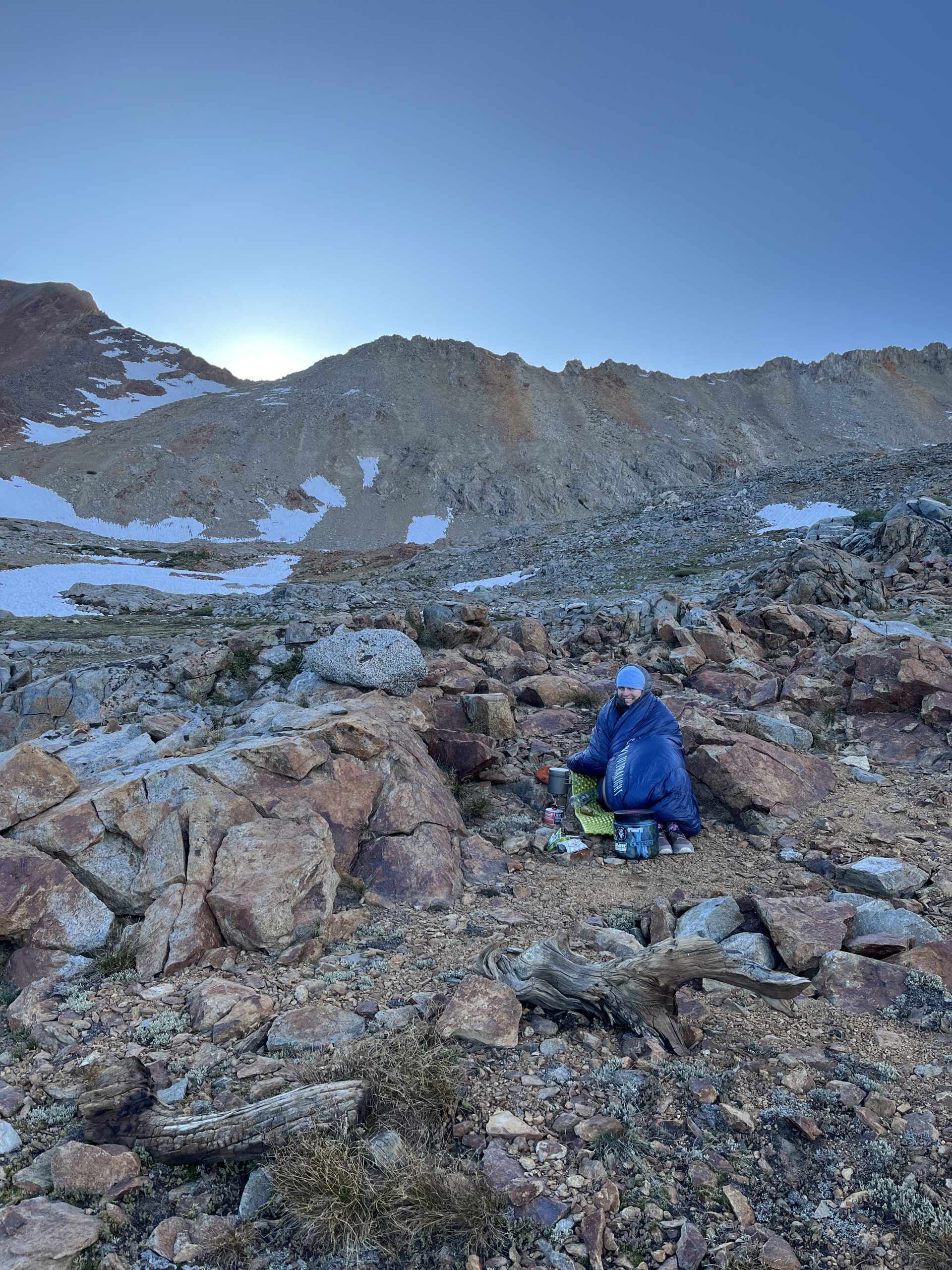
21/6 — Day 51 — 22 mi / 35km
In the night, the tent bucked and strained against the wind, which continued to whistle through the teeth of the mountains in the early hours of the morning as we climbed up to Pinchot Pass. We looked like children hastily bundled up by distracted parents, every layer on and most of them askew. The air was cold, knife-sharp. As we gained the pass, first light fell on the long ridge line to the west and the brightness moved slowly down the rock like the loading bar in a video game.
We climbed down the pass towards a couple of lakes that lay cobalt dark, and which like us, were as yet unacquainted with the warmth of this day’s light. But soon the sun sat itself upon the trail and bade us join for brunch, so we sat with it in the grass for oats and coffee.
It wasn’t far from Pinchot to Mather Pass, so there was a premium on moving quickly. In the afternoon sun, the snow on Mather would be slushy and difficult to navigate. Between the two passes there were innumerable river crossings, cold enough that before long the nerves in our feet had given up protesting.
We topped out on Mather just before noon. All the mountains around suggested castle metaphors: walls, ramparts, citadels and towers of granite, girded by moats of water that, even from up here, looked cold enough to jab the air right out of your lungs. They say a pass a day keeps the doctor away, but here I was having done two passes before midday and I still had a doctor on my tail. The doctor could have done with some medical attention herself, actually. She had developed a raking cough to compliment her headache and her mucoidal output could only be described as prodigious.
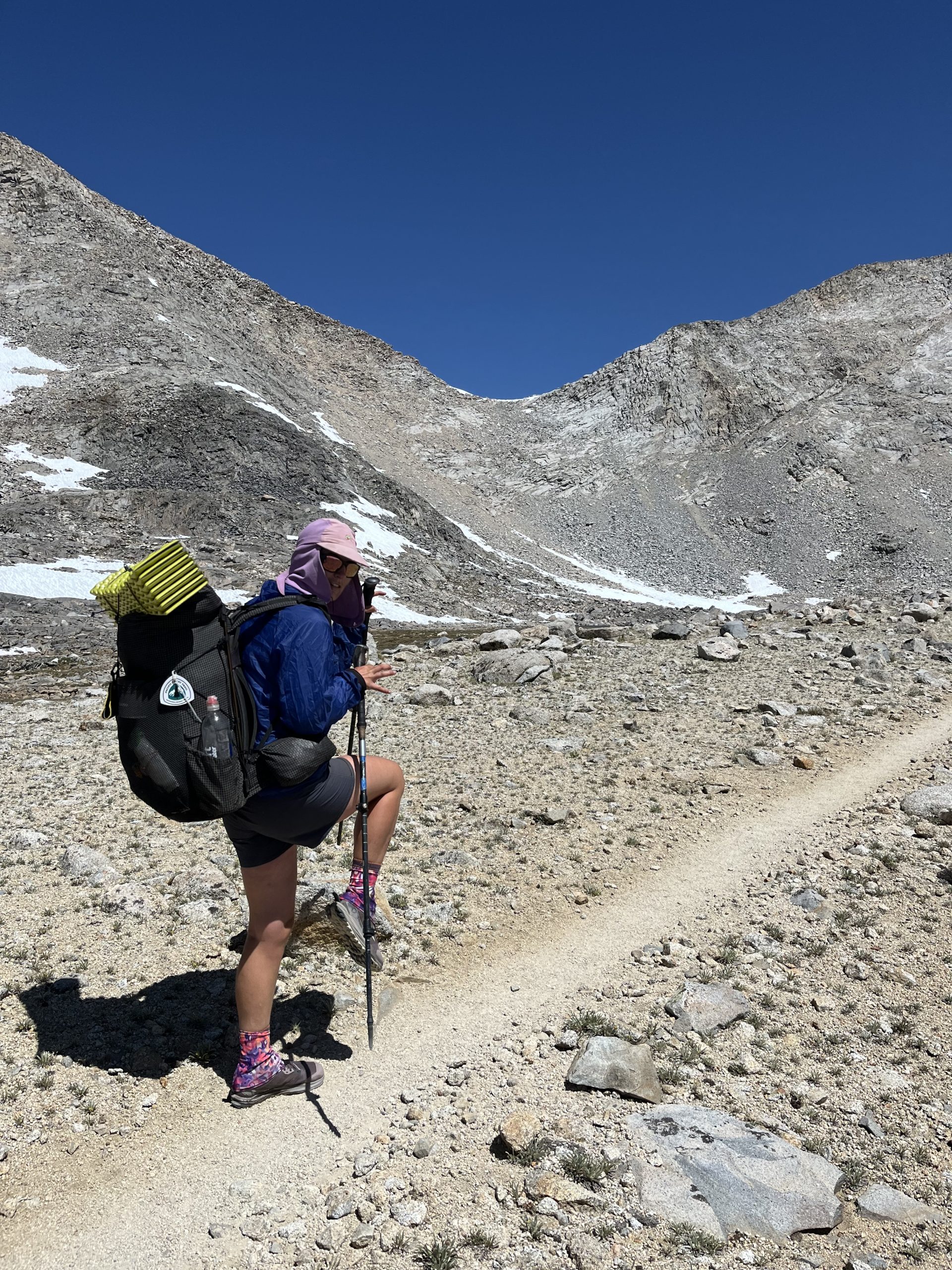
Cold feet make fast work of Mather Pass
So, Flies was slow down the pass—another delicate and awkward passage through mixed snow and rock. Bereft of sunglasses and vulnerable in the noontime shine, I climbed down a minute at a time and waited with my eyes closed, the light warm and red through the blood vessels in my eyelids.
We descended to Palisades basin and took lunch by one of its shallow lakes, framed by a brilliant array of wildflowers and bright white granite. We were still 20 miles from Muir pass, which was said to have miles of snow still, and it was important to get there early for firm snow and soft light. We set off hoping to push well up the canyon, but my back kicked off, as it sometimes does, the muscles on either side of my spine wrangling over it like parents fighting for custody over their only child.
So we parked up at a glorious, calm meadow a little ways up the Middle Fork of the Kings River, under stout Jeffery Pines which stood like the pillars of heaven under the softening light. Wind shivered down the meadow, and through the swinging grasses the river curved calmly, an altogether different presence from the torrent rushing cleanly through boulders and fallen trees below. This meadow too was plugged with huge boulders which time had unfastened from the cliffs above and a few deer nosed quietly about them.
There were four hikers cowboying in the trees and we joined them; they had a fire. Two were from the Netherlands, and they’d made their way over as crew on a sailboat, having renounced flying. “Did five miles today,” they said, laughing. “Saw this meadow and had to stop. We’re attempting an FKT—funnest known time.”
22/6 — Day 52 — 21mi / 34km
Mist hung over the meadow in the morning, the breath of the water, and first light faint and diffuse washed across the sky. There’s a saying in the outdoors: “Be bold, start cold,” because you always warm up fast when walking. This wasn’t a problem for Flies in the Sierra because when she put on all of our layers, she was still cold. It wasn’t even possible for her to violate the backpacker’s maxim.
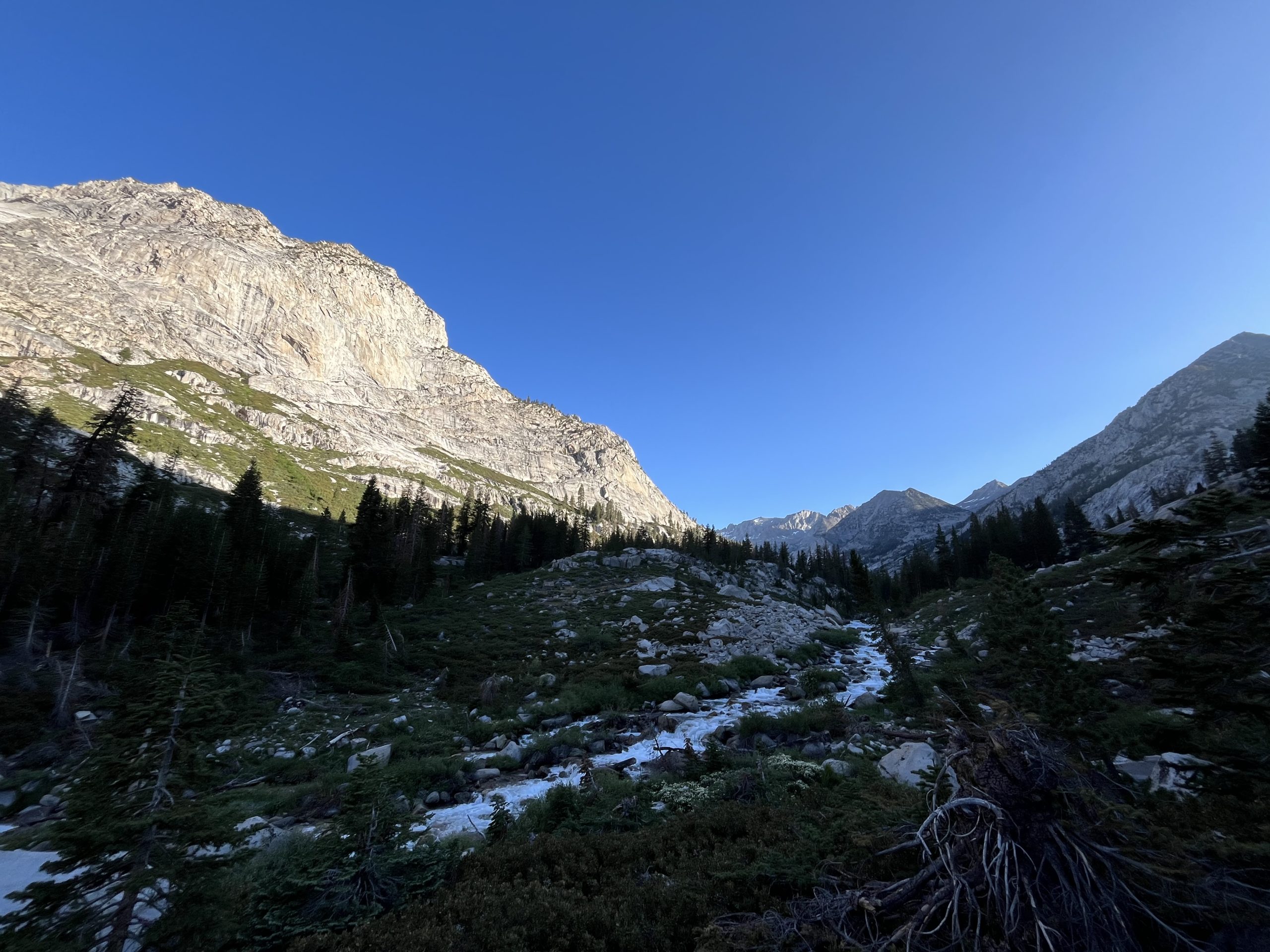
The canyon was a clean halfpipe, and as the sun rose, the wall to the west again became a screen of bright yellow light, like an installation at a festival. We climbed steadily, passing a guy in camp who looked like Shaggy from Scooby-do. He held up his quilt to us and said “Got shat on by a bird!”
The avian contingent was strong. In the bushes, a grouse made a sound like air blown over the lip of a bottle. We passed through trees raked by bear claws and comforted ourselves with the knowledge that the bears would prefer people hiking the John Muir Trail to us stringy thru-hikers. We were whatever the opposite of Wagyu Beef is, all tendon and bone and not a juicy cut to be seen. Even Grace’s rump was all muscly now, and looked less and less like good eating.
Then I fell in a river, so we took a breather and dried off. Soon it was discovered that the breakfast which we’d made up and sent ourselves was salty to the point of inediblity. “At least we won’t need electrolytes today,” Flies said.
We met a park ranger, Amanda, who had a little aerial poking up out of her backpack. I explained about the sunglasses situation and she said she had some spare, 2 miles back, at her hut, just for this purpose. “Those snowfields are going to take some hours to cross,” she said, “you’ll need protection.” Walking an extra four miles back down and up was out of the question because thru-hiking only goes forwards. It would be a kind of blasphemy, I explained. Amanda said she’d go back down and give the glasses to another hiker. I should have told her to give it to someone who looked fast, because we never did get those glasses.
Instead, after we’d climbed past Helen Lake—named for one of Muir’s beloved daughters—up through perfect, rolling, skatepark quality granite and into the high wide river of snow, I wrapped my eyes in the Manzanar volunteer bandana Tia had given us. It filtered the light just enough: I could see vaguely where to step and my retina weren’t getting seared to blankness.
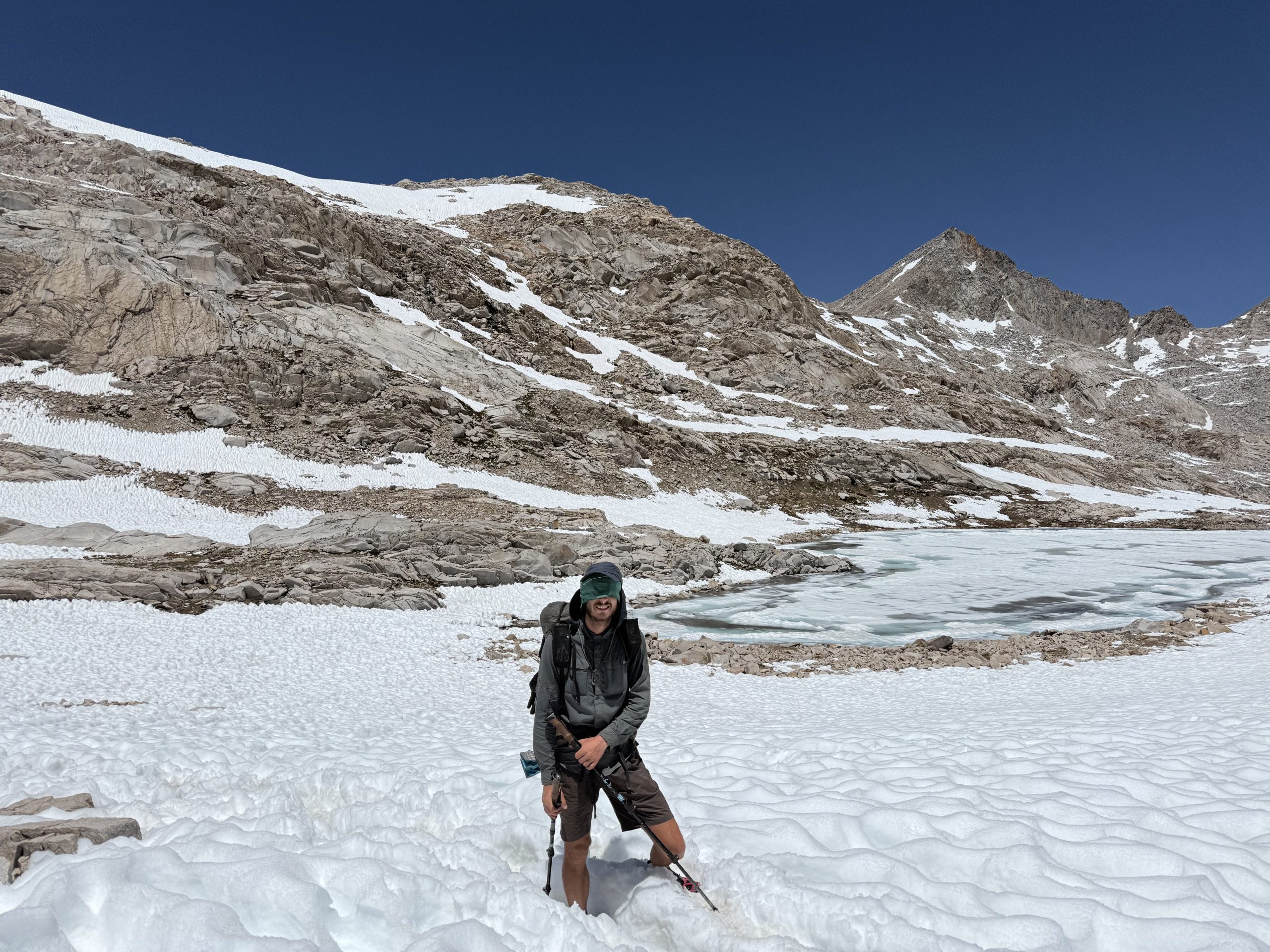
Problem solved
The snow was sun-cupped, grooved in little ridges like sand in the desert, and it popped and crunched under our spikes during the hour it took us to climb the last mile up to the pass. Sitting in the pass itself was the handsome Muir Hut, from which spilled raucous, echoing laughter. We went inside, half blinded by the dim, our pupils pin-point small from the brightness outside, and found a group passing around a school exercise book titled ‘Confessions’. Inside the book. it said: “Here we confess our scruples, wrongdoings and ruminations to Big Daddy Muir so that we can go forth and enjoy nature with a guilt-free conscience.”
I flicked through the pages. The confessions involved everything from errant cat holes to dicey handjobs.
“6/15: I watched Brokeback Mountain with my hiking buddy and now it feels like we lowkey like each other.”
“6/16: I was running out of food so I stole a mountain house dinner from a bear box. When I got to camp I discovered it was stuffed full of used toilet paper. I am still hungry.”
“6/17: I was having a bad day and I told a marmot to fuck off.”
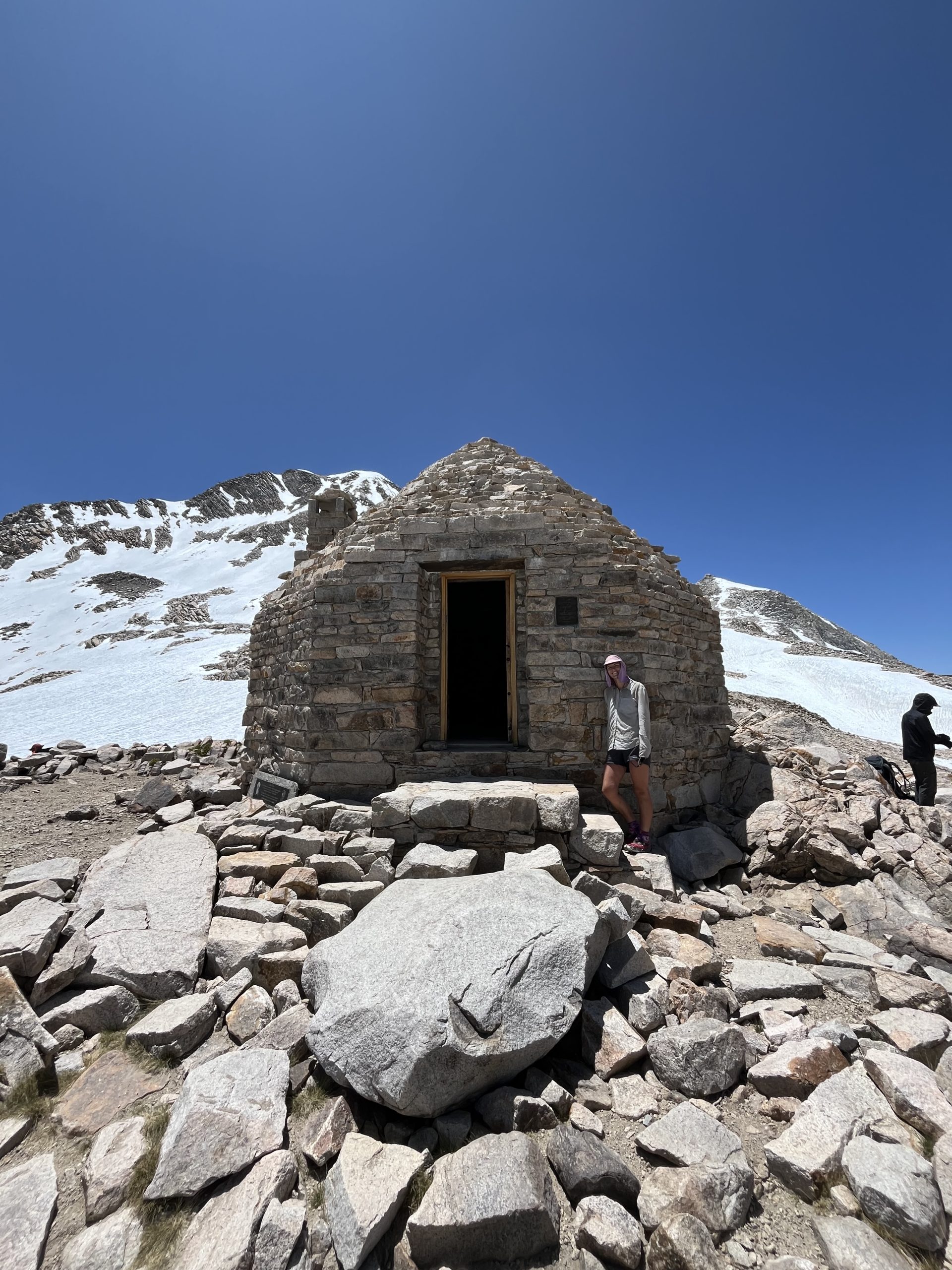
We began our descent into Evolution Basin, the peaks about named after the leading proponents of the theory in the 19th century, approximately half of whom were virulent racists. Halfway down, a powerful signal from my bowels sent me scrambling for my water bottle bidet cap, but I discovered with horror it was gone. I got my knife and pierced a hole in the top of my regular cap, grabbed the hand sanitizer, and scrambled with a rapid delicacy into the field boulders. It was a terrible location to be emptying one’s bowels: water everywhere and hardly a handful of soil to dig in. Desperately, I pried up a rock the requisite distance from water and scratched away, but not even Doug, our trowel, was much help. By the time I had a morally defensible cathole I was on the verge of defecatory disaster. I was well overdue: several days had elapsed since the last time I’d gone, back in Independence. Release, when it came, felt like deliverance. I cleaned myself and stood up. It felt like a whole new physiologic paradigm—the real estate in there!—but my elation turned to mortification when I turned around and saw a string of people hiking past with a clear view of my position. I’d miscalculated where the trail was headed and exposed myself gratuitously. We were going to have to walk past them in the not too distant future.
I consoled myself with some chilli lime tortilla chips, which alone among the things of this world were independent of the law of diminishing returns, and we continued down past the Sapphire and Evolution Lakes. The granite was polished to shining, and purple heather made a garden of the basin. Flies and I filled our bottles and reminisced about the desert. We used to take any old worm-riddled dribble of water, and now look! It was the equivalent of being born into poverty and becoming a millionaire, as far as hydration was concerned.
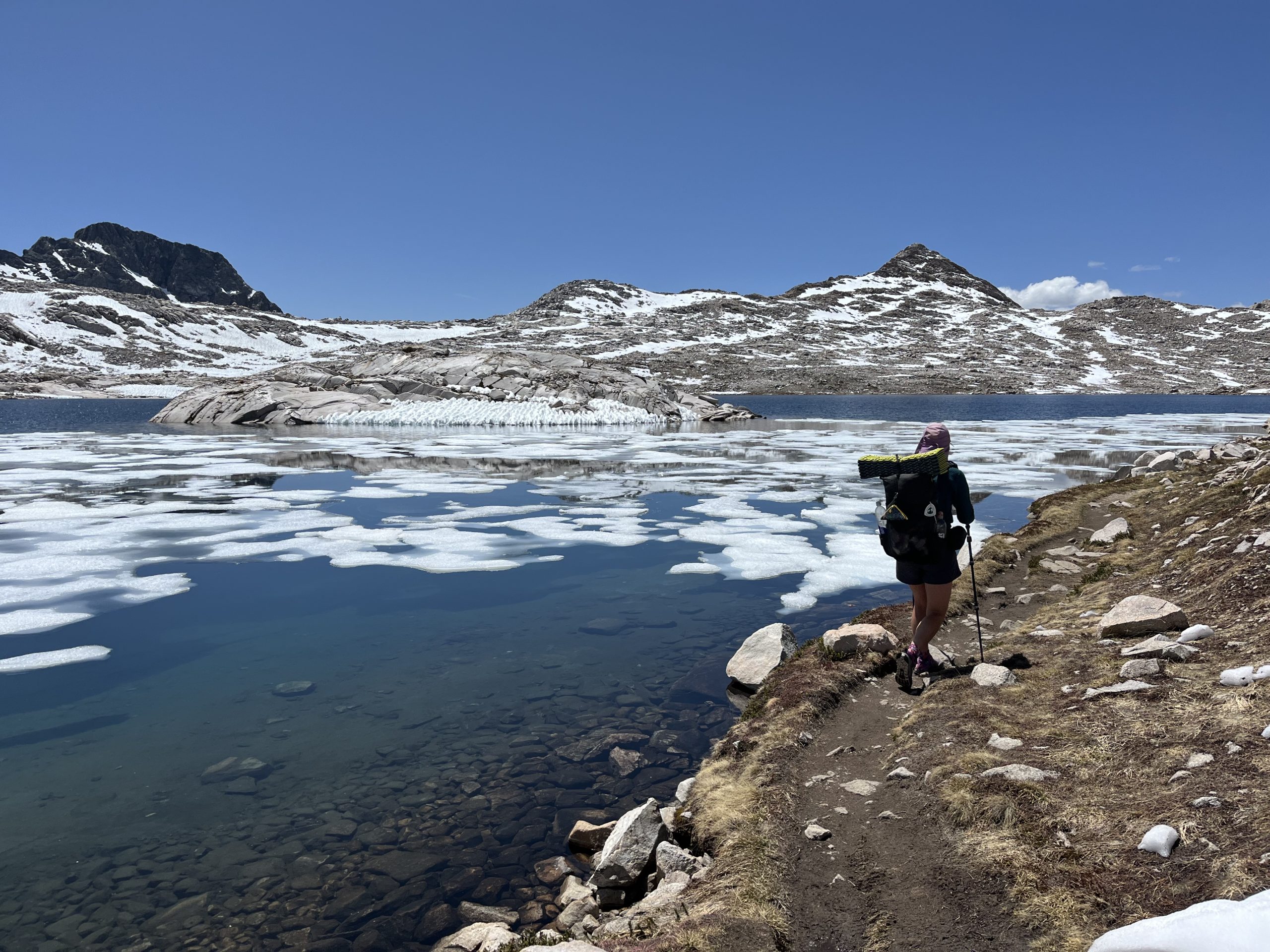
Flies’ headache had eased, but her cough was persistent and she was producing snot on a quasi-industrial scale. Moreover, despite the semi-regular lake rinses and twice daily application of Vaseline, she was fighting a losing battle with rashes on her thighs and lower back. So we clambered down into the canyon and made camp, plucking a few wild spring onions from a creek as we went and slicing them up into our PB satay dinner.
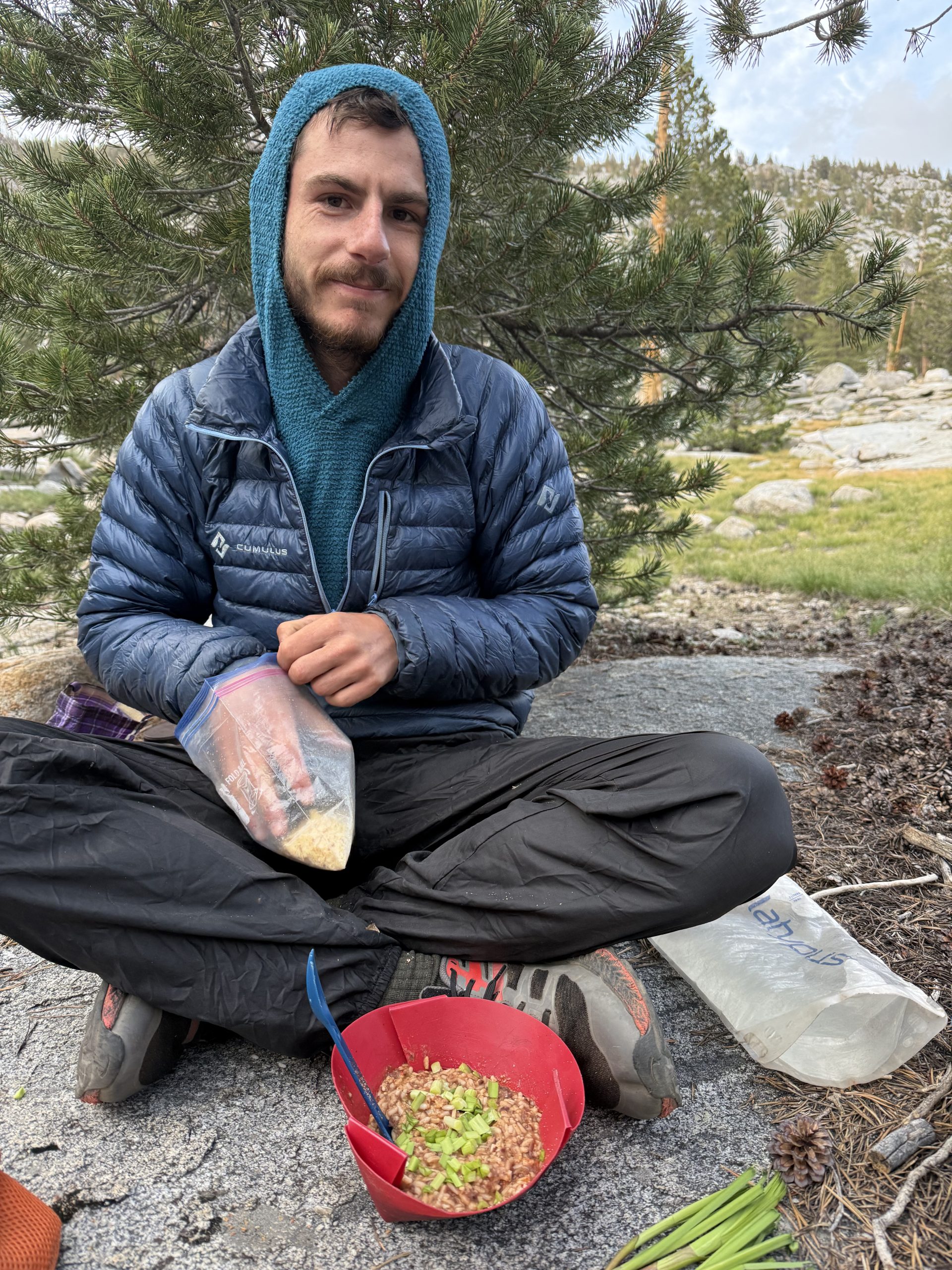
Now that’s cookin’!
23/6 — Day 53 — 25mi/40km
My pillow deflated over night without cause. It seemed my fate, a cosmic law: all that which inflates shall deflate. The miles that morning were easy. We gallivanted along toward Muir Trail Ranch. It was a mile off trail and enatailed a steep climb back up to the PCT, but the hiker box there was legendary. My friend Ned said he’d done a 10 day resupply purely from food discarded by Muir Trail hikers. There were also reports of nearby hot pools. Surely, we figured, one of these gambles would pay off.
There was a stagnant pond by the trail, and as we sidled by we collected a veritable swarm of mosquitoes. We quickened our pace, but our airborne pursuers were at least as fast as we were over short distances. They settled on and bit our legs in their dozens, and we became frantic. I pulled ahead of Flies, who was still consumptive and not exactly liable to break the land-speed record any time soon. If I could outpace her, I’d be safe. There is no such thing as solidarity in Mosquito Land.
We arrived in a fluster at Muir Trail Ranch having deployed our 100% emergency DEET only to find the hiker box empty. A JMT hiker with duct tape on the seat of her pants came to rescue, depositing a 750ml jar of organic Almond Butter. “5000 calories!” I said. Flies, watching with mild disgust as I spooned a third of the jar directly into my mouth, was less enthused.
Shaggy, of bird-poo-on-quilt fame and his brother Swab Bottom were there too. Swab Bottom lathered up a tortilla with Nutella and then cut thick chunks of Wisconsin cheddar on top, rolled it up, and ate it in three bites. “This is a new invention of mine,” he said, “Nutella is good and cheese is good, so you would think it would be good, but it’s actually disgusting!”
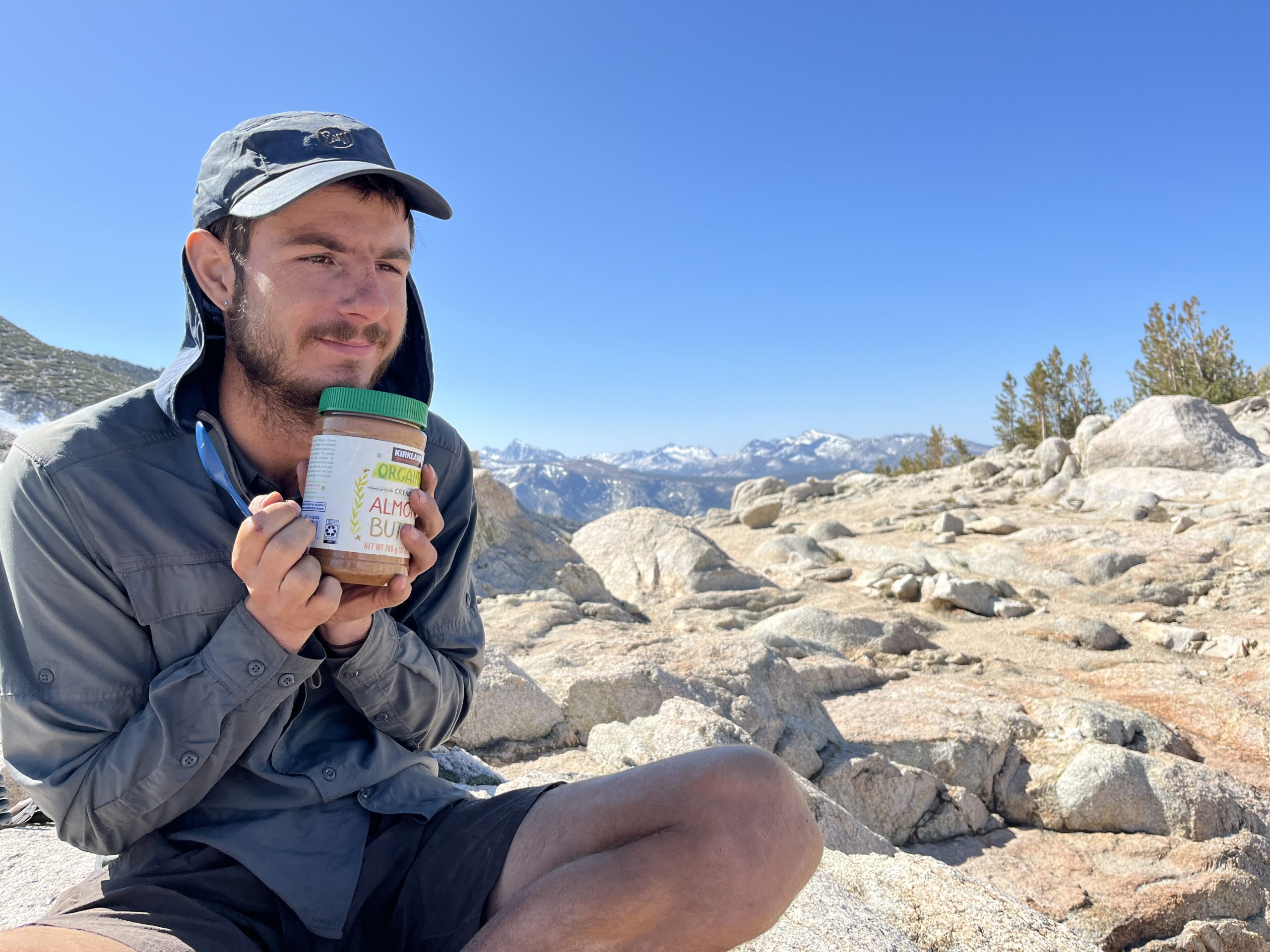
With the snow melt, the river was too high to cross, so the hot pools were out of the equation. Moreover, the ranch had an up to date forecast that said thunderstorms could develop in the area that evening: we needed to hustle over Selden Pass ASAP. Hustling up the steep climb back to the PCT probably expended a significant portion of the calories we’d procured by venturing down. And then we had a long, toilsome slog up to Selden Pass. I was knackered. Flies looked to be on the verge of death. We stopped for a coffee and she put on every layer available before lapsing into a state of passive resignation generally associated with those who have lost the will to live. I gave her coffee from the Nalgene as one might feed milk from a bottle to a lamb.
Fortified, we resumed, and just as we stepped back on trail, a couple walked past with tiny backpacks. It was John Z, YouTube famous thru-hiker and founder of the stylish ultralight backpack company, Pa’lante. “Hey, it’s John Z!” I said, like an idiot. He turned just enough for me to register his pained expression and continued walking. We walked behind them. There wasn’t anything else for it. Storm clouds were brewing, tendrils of rain hung ominously in the west: we needed to get over Selden. We walked past some gorgeous lakes, up over the pass—just in time—and just 100feet behind them the whole time. If anything, we were slowly gaining on them—our afternoon coffee had done its work. This was awkward. I wanted to call out “we’re not pursuing you!” But that would have probably been worse. But I did get to observe the long, easy gait of John Z in action. His style was a casual, hands in the pockets kind of hiking: he made it look effortless. Effortlessness sells.
Finally, we caught up and ended up walking and talking together for several hours. Alex, John’s partner, was a literature major. She gratefully accepted some Vaseline from Flies, having had the backs of her knees burnt to a crisp from the reflected snow on Muir Pass. John talked about his new brand, Meadow Physics. “I’m making a really tiny pack,” he said. “I thought all your packs were tiny,” I said. “Yeah.” He said. “But it’s, like, really tiny. Gonna call it the Johnsport. For thru-hikers who get mistaken for day hikers.’”
We said goodbye halfway up Bear Ridge: for some reason, after having walked a marathon in the High Sierra while chronically ill, Flies was feeling tired. They used to send consumptives to the mountains to cure their tuberculosis, but it didn’t seem to be working.
24/6 — Day 54 — 14mi / 22km
Flies and I cowboy camped, and the bright moraine of the Milky Way looked resplendently serene, scattered down the canyon of the night. Nearer to earth, things were somewhat less serene. At one point in the early hours, Flies cried a little—not because she was dying of tuberculosis, but because the new foam pad she’d bought was so uncomfortable. There on the side of Bear Ridge that night we learned definitively that she was an inflatable pad kind of girl, and resolved to find the cushiest Thermarest in Mammoth once we got there.
Mammoth. The next town—alluringly close, a mere day and a half of walking. If we were willing to eat all the almond butter, we had enough calories to make it. I was particularly keen on this idea: I felt like my increasingly paleolithic facial hair would go down well in a town named after a hirsute, prehistoric elephant. Deriving the better part of your daily caloric intake from almond butter isn’t everyone’s idea of a good time, however, so we took a side trip to the Vermillion Valley Resort a half dozen miles off trail.
As the sun lay its palm on the cold cheek of the mountains, we clambered down to a large reservoir and skirted around its side, arriving at the resort just after 10. Cobbler was there! We’d not seen him since Tehachapi, when he’d had to take five days off and skip 150 miles to let his blisters heal. Somehow, his legs were still as pale as when he’d started—an accomplishment unrivalled by any of the thru-hikers we’d seen, and which indicated a strong financial quarter for Nutragena. I wondered if it was too late to buy some stocks. Cobbler—still up to his old, generous tricks—palmed off a few shower tokens to Flies.
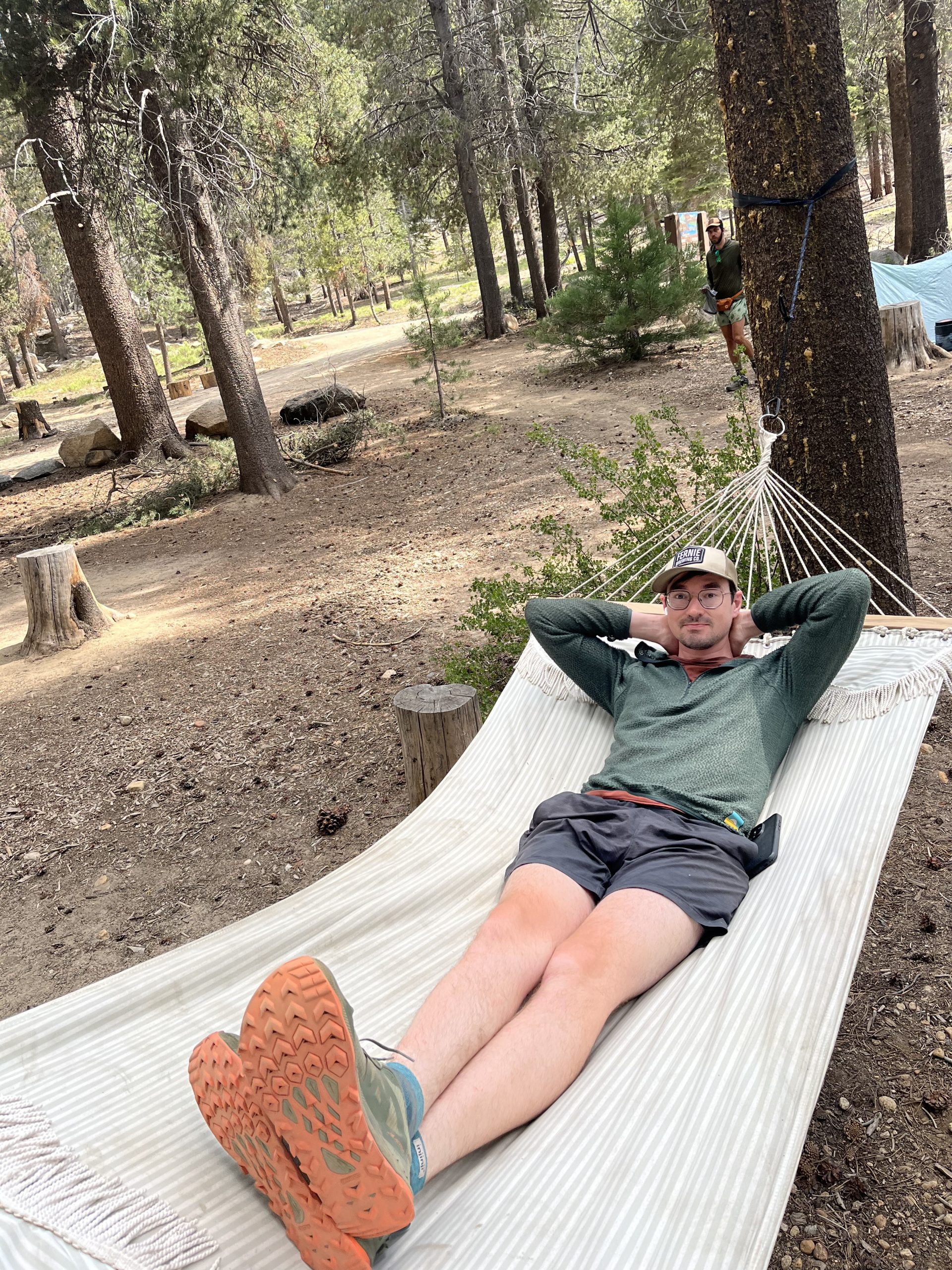
Admittedly, his knees were a shade darker
After reunions, we beelined for the restaurant and discovered that it had closed at 10am, just as we’d arrived, and that it would be a couple of hours before it reopened for lunch. Adults should be able to take this sort of news on the chin, but thru-hikers are only adults in a remote sense, our appetites urgent and unreasonable as infants’, so we were crushed. Consolation came in the form of several ice creams which tided us over to feeding time. Someone came out and rang a cowbell and the entire population of some 40 hikers stumbled into the restaurant with the glazed expressions of livestock, their many stomachs urging them toward the trough. Soon the litany of ludicrous trail names rung out. Guuuuciiii! Beeearfuckerrrr! And, finally, “Fliiiies!”
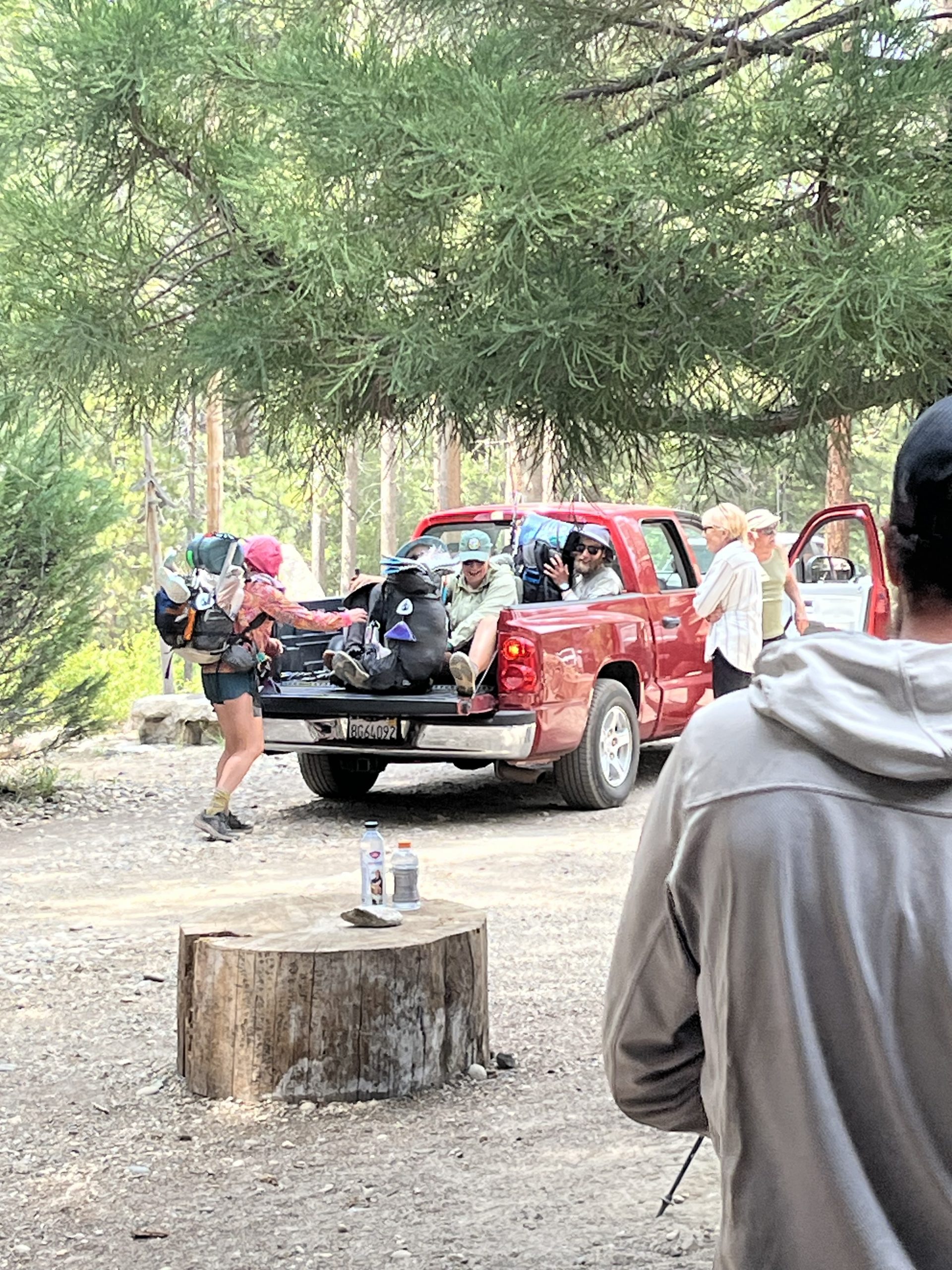
To the trough!
A teenager with curly brown hair and dark eyes came over. “Sup” he said. “Sup,” we said. “Man, I could kill for a beer,” he said. “Can I have some of yours?” “No.” I said. “How about a snickers bar?” He tried. “No,” I said. He squinted at me, like c’mon. “It cost like $3!” I said. The kid slumped in his chair, scrolled through his phone and then stood abutuptly and went to hassle GTA for a cigarette. “Dude,” she said, “where are your parents?” “Over there,” he gestured vaguely toward the RV park. “Hey, you’re pretty cute,” he said. “Can’t I just have a puff?”
His name, we learned, was Noah. He was jaunty, nerdy and fast-talking, “I have ADHD,” he said. “I got Adderall if you want it. I’ll trade you some for a cigarette.” “Noah,” I interrupted, “you are going to have plenty of time to be an adult. Just enjoy being a kid for a while. It’s nice! No rush.” He dragged his eyes away from GTA. “Honestly bro, that’s kind of patronising, but you mean well, and I appreciate your concern.” Then he went over to Flies and told her she was pretty. “Also,” he said, “your boyfriend is talking to another girl.”
That afternoon, as we packed in our resupply and readied ourselves for the ferry back to trail, a chorus of tuneless hikers belted out a raucous rendition of happy birthday. Dory paraded a large chocolate cake to the picnic table where Gucci stood red-cheeked. Someone called out, “How old are you turning Gucci!?” “29!” he said. Noah, who for some reason was holding the knife, said, “I’m 14!”
The ferry captain called us away before we could get a slice. Dark clouds elaborated themselves above the lake. The ferry was a barge seemingly made of plywood and the captain was an enormous, jovial man with scaly legs and a grey beard spilling down his chest and over his paunch, a real a salt-dog Santa Claus. “Full disclosure!” he yelled over the sound of the splittering engine, “I rode this thing up on a sandbar the other day and it may or may not be mortally wounded! Passage is conditional on your being competent swimmers!” He organised us in even numbers on either side of the barge and we were off.
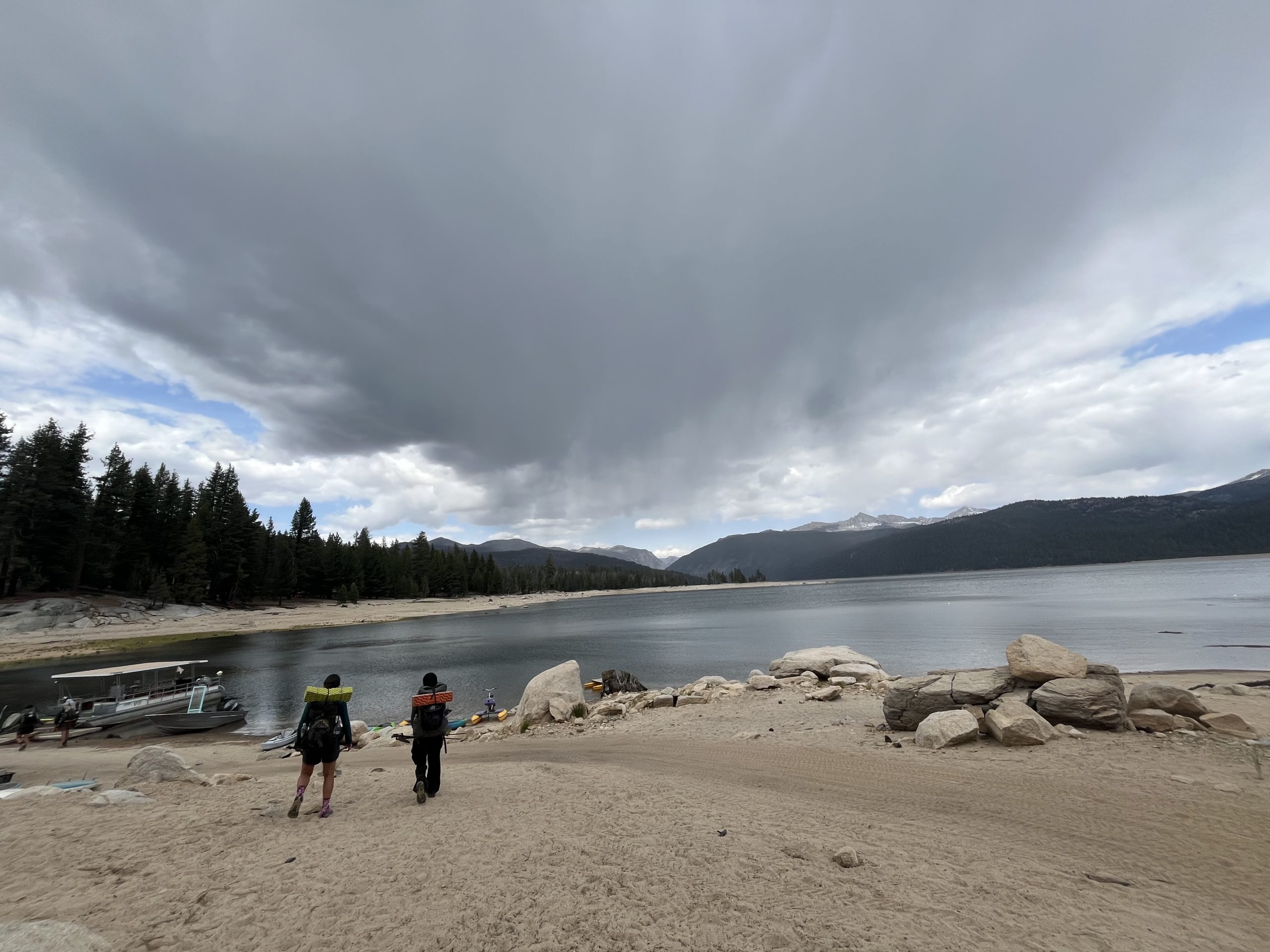
It started to rain halfway across the reservoir and lasted all of 10 minutes. It was the most rain we’d seen since we’d come to California. Someone got up to move to the sheltered side of the boat. “Hold your position!” The captain yelled, then turned to me, “Hiker! The jet! Is it vigorous?” I peered over the back of the barge and assured him it was. He was looking at me the whole time, and the barge veered dangerously towards the dam before he realised and righted it.
We disembarked on the eastern shore of the reservoir and a dozen wet hikers piled on. There was a forestry service worker running to get there, one of them explained, could you wait a few minutes? The captain took an air horn out of a bucket and peeled off a few blasts to get them moving.
We set off along a trail half-cleared of blowdowns. All the trees around there seemed dead set on falling over. This was inconvenient, because the mosquitoes were horrific and the obstacle course made us easy targets. As a Buddhist trying to adhere to the precept of non-harming, swatting was off the cards. So, as I stumbled along breathlessly, I brushed them off as best I could and tried to reason with them. “That’s enough, guys,” I said, in a firm but fair tone, “you need to leave some blood for me to use too.” Guys was actually a misnomer. They were all females, desperate for the proteins in my blood so they could make their eggs. I was the victim of motherly love. Finally, we were overwhelmed: we had to deploy the emergency-only 100% DEET once again: twice in as many days. It was death by cancer or death by blood-letting and we figured the cancer at least would take longer.
So we went to bed that night below Silver pass lathered in industrial strength pesticides. Flies was producing mucus that, were it not for its insalubrious origin, would be a substance of rare beauty. It was bright orange, and hung in long strings when she attempted, with diminishing efficacy, to snot-rocket. There was not a single square inch of dry fabric left to blow her nose on. Before we went to sleep, Flies gave me a lozenge. I seemed to have developed a sore throat.
25/6 — Day 55 — 21mi / 34km
Silver Pass was blinged out with lakes and wildflowers and the gradient was merciful. Which was a relief as Flies and I were in sorry shape. She protected me from the mosquitoes while I filtered our water, brushing them off my vulnerable legs.
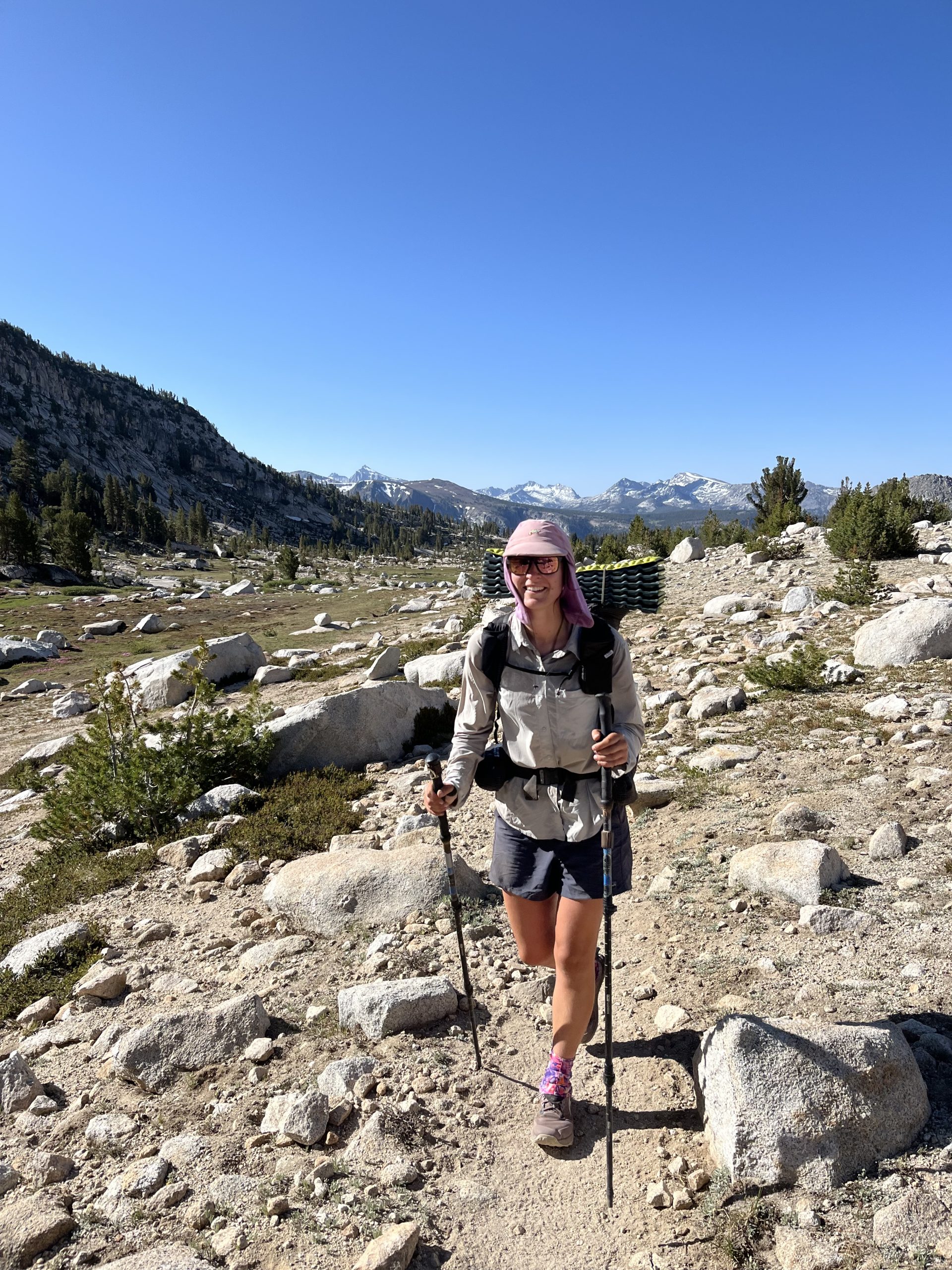
Half-dead, still smiling
As we clambered down the pass, an approaching hiker called out to me, “Hey, are you the Kiwi Hot Hands?” I blushed, figuring she was a fan of the blog, and confirmed my identity. “I’m Hot Hands too!” She said. “I’m southbounding the JMT right now, but I did the PCT in 2019. Got my name in a molten pizza incident at De bennedetti’s. Everyone the last couple days has been saying to look out for you. I never thought I’d meet another one!” I said, “Hot Hands, it’s an honour to meet you.” She said, “a true privilege.”We pressed the palms of our right hands together and went our ways.
It was hot. Flies and I slogged up a hill, swam in a gorgeous—ergo, mosquito infested—lake, hastily re-clothed and took off with our winged friends whining along in pursuit. Lunch, of necessity, was had in the windiest place we could find. Flies was once again let down by the American fermented dairy products. “I keep expecting it to be the colour of cheese, and it never is,” she said, ruefully.
We arrived at camp that night just a few miles before the trailhead that would deposit us at the road to Mammoth. I’d developed a hacking cough. My throat felt pulpy and raw. Retrospectively, I couldn’t believe how little Flies had complained this last week, and was shamed into a faltering stoicism. As for Flies physical condition, well, the less said about that the better. All our gear seemed to be failing, too. I was going to have to mend yet another rip in my hiking shirt. Flies’ packstraps had almost worn through. The zip on our tent had jammed.
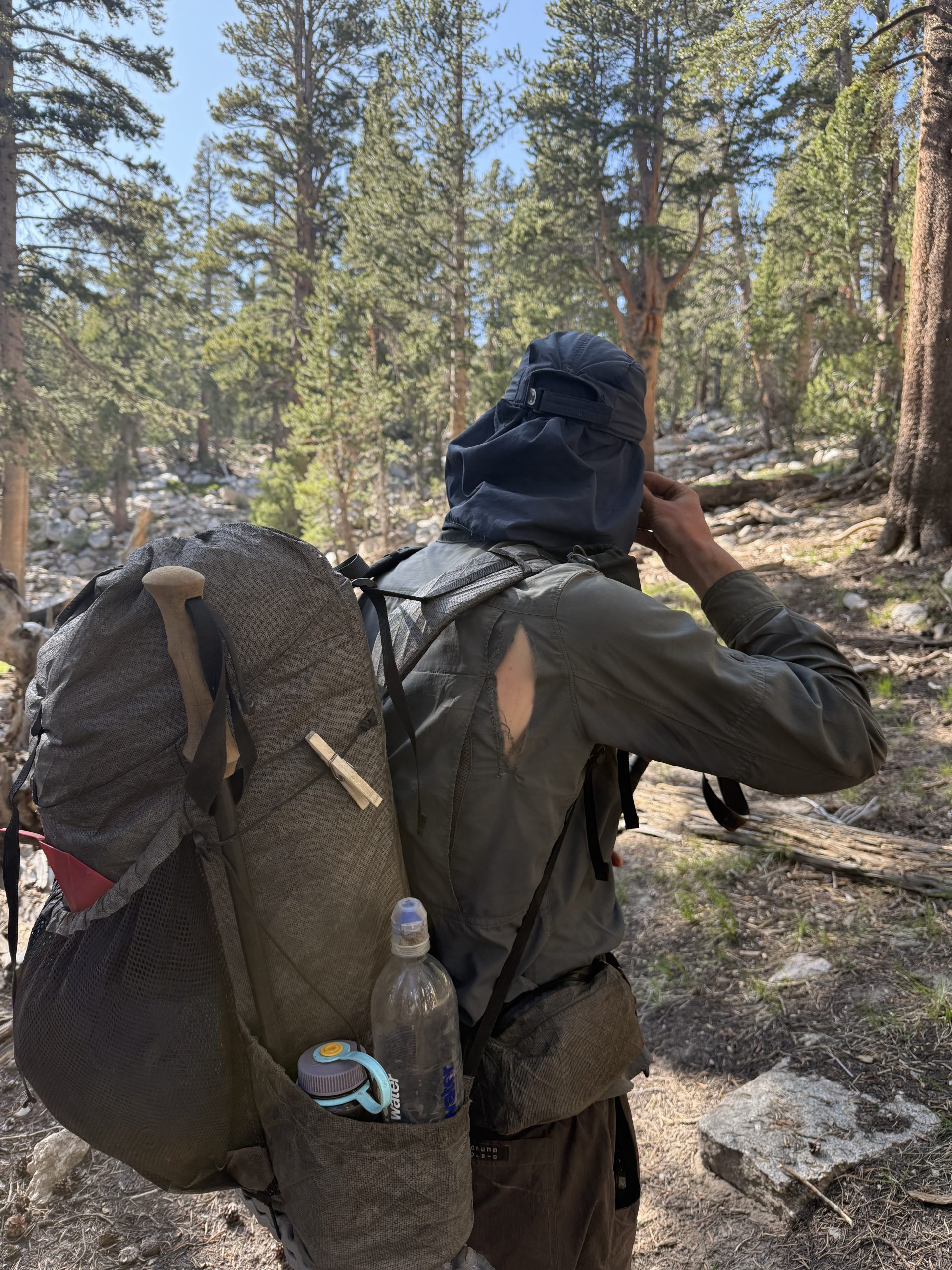
26/6 — Day 56 — 6mi / 10km
Somehow, things deteriorated further overnight. Flies got a weird chest pain that wouldn’t go away—hopefully just heartburn?—and spent a good part of the night sitting up, because it was more comfortable, and crying. She was a shell of herself in the morning. She’d already been a shell of herself, so technically she was now a shell of a shell. “How fun is thru-hiking?” I rasped. “So much fun,” she rasped back. I stepped out of the tent and heard a rapid pounding, turned, and saw a large bear barrelling down the hill towards Skye, who was sipping coffee outside her tent about 20 metres away. The bear registered her presence at the last moment and veered thuddingly past. Skye turned, saw me gawping, and said, “Jesus fucking Christ.”
The few miles to the trailhead were nice and easy ones over the wide, gentle Mammoth Pass. We passed a deer stepping tidily through the litter of branches. A Stellar’s Jay flitted from branch to branch. Pictures of health, both. I hacked out a greeting punctuated by a glob of sputum. Flies shuffled listlessly along like someone very old. She needed to trade in her walking poles for a Zimmer frame. “Your longest ever stint of hiking,” I said, hoping to boost morale. “8 days straight!” Flies looked at me vacantly, as if time no longer retained meaning. “Took a toll,” she said.
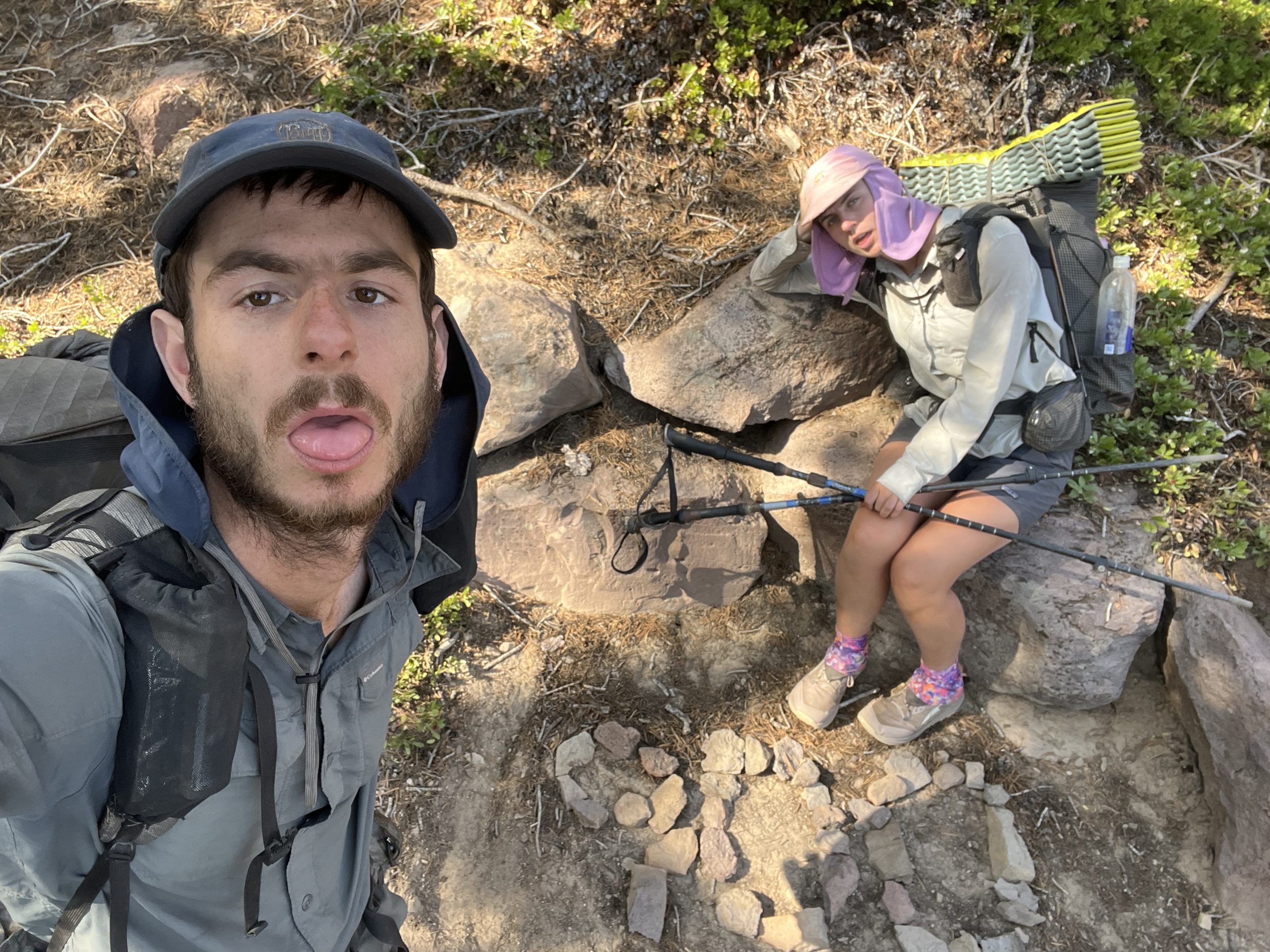
Took a toll
As we neared the road, a steady stream of day hikers passed us, heading out for the morning. Most gave us a wide berth. One man approached, tugging along a tiny Maltese dog dressed in a pink tutu. I said, “she’s pretty!” “Oh, he’s not a girl,” the man said cheerily. He turned to the dog, which stared back at him with dark, bulbous eyes. “You’re a boy, aren’t you handsome?” The dog affirmed its gender with a wag of his tail, which poked out the end of the tutu. The man picked him up. “We’re just going to McCloud Lake today,” he said, burying his face in the white fuzz of the dog’s neck—“because you’re veeeewy tired, aren’t you Mr Shnookums?
Flies and I stumbled into the Ventura Inn mid-morning. The kindly Indian man at the reception was so concerned with our appearance he checked us in 4 hours early and prescribed a lemon ginger tea. On the TV there was something about Iran and air strikes and nuclear weapons. I tried to take it in but the man took us away. “You need to rest, sir.” He said. “Lie down now.” We shut the curtains and lay in the small, womblike room. We did not talk. We were tired, more tired, even, than Mr Shnookums. In the gloom, I lapsed into a state of being that could not properly be called human. Flies lay motionless, possibly dead, I did not know. How she’d just walked 125 miles through the High Sierra, through that mountain-creased, snow-limned place, I did not know. That didn’t matter now. We had deserted the army of the ambulant. Our concerns were strictly confined to the horizontal plane. In that country, the country of the recumbent and the sick, all knowledge is vague and befogged but for the knowing that pulses in a besieged body, that knowing which upright, healthy citizens yet deny: entropy and decay are all conquering. Our restless, fretful productivity means little, and will cease. All the miles will melt to nothing. The vital heat in us will one day be smothered, and the sun that morning will rise cold and dull as stone. It was nice to think of this, as we lay there: the end of effort, lazy oblivion, the capitulation of the will, finally and forever.




